- Home
- Ann M. Martin
Better to Wish Page 8
Better to Wish Read online
Page 8
“Happy Valentine’s Day,” he said, “one day late.” He withdrew his arm and loped ahead of Abby and Rose, along the sidewalk and across the lawn to his front door. Abby watched him, thinking that he moved very gracefully for a boy, and noticing that his jaw had grown squarer and his shoulders broader.
“Abby has a boyfriend!” Rose chanted when Zander was out of earshot.
“No, I don’t.”
Later, after Abby had lugged Fred back inside and was taking off his jacket, she heard a crinkling sound and reached into the pocket of her coat. Her hand closed around an envelope. She pulled it out and saw her name in neat printing. ABIGAIL.
She waited until she was alone in her room to open it, and inside she found a card showing a girl and boy joyfully riding a giant bumblebee, the words Valentine, I’m abuzz over you trailing in the wake of the bee. She flipped the card open. Zander had written BEE MINE, ZANDER in the same neat handwriting.
Abby frowned, then smiled, and added the card to the ones she’d received from Rose and Sarah the day before.
She hadn’t dared to give Zander a Valentine.
“It snowed!” Rose announced. “Abby, it snowed last night!”
Abby sat up fast, tossing her covers back, and knelt on her window seat. Snow covered the ground and the branches of the trees and the roof of Zander’s house.
“Ha!” said Rose from the doorway. “You’re using the snow as an excuse to look in Zander’s window.”
“I am not,” said Abby, which was a lie. She liked any excuse at all to see what might be going on in Zander’s room. Sometimes she watched him writing at his desk and sometimes she watched him lifting weights, which he did because his older brothers told him he was as scrawny as a chicken. This was absolutely untrue. But sometimes, like now, the blind was drawn, and then Abby felt unreasonably shut out and disappointed.
“His blind is down,” she said, and flopped back on her bed.
Rose hesitated in the doorway. “Mama’s talking about the babies again,” she whispered.
“What?”
“The babies. The ones God took.”
Abby sighed. “I don’t know what to do about that.”
“Why can’t she be satisfied with her living children?” asked Rose, twisting the end of one braid around her finger. “She has us, and she has Fred, and she has Adele, who actually is a baby. But she’s been outside, covering up the rosebushes and wondering why God took her babies. Pop saw her and yanked her arm and said, ‘Go in the house, the neighbors are watching,’ because Mama was only wearing her nightie and a pair of boots.”
Abby closed her eyes briefly and Rose sat on the end of her bed. “Don’t worry. Sheila’s taking care of Fred and Adele,” said Rose cautiously, trying to gauge her sister’s mood.
“It’s almost Christmas. I thought the holidays would make Mama feel better.”
“So did I,” Rose replied.
“Maybe … I don’t know.”
“I wanted to make gingerbread today.”
“Ellen will help you.”
“I wanted to make gingerbread with Mama.”
Abby gave her sister a small smile. “Sarah’s coming over later. Her parents are going to do some Christmas shopping in town. Maybe Sarah and I will go into town, too. Want to come with us?”
Rose nodded. “Okay. Thanks.”
Sarah arrived just before lunch. “Bye, Mother. Bye, Dad,” she called as the Moresides waved from the windows of their car.
“How long can you stay?” Abby asked her.
“Mother said they’ll be busy for three or four hours. Let’s go play with the baby first. Please? Can I hold her?”
“In a bit,” said Abby. “She’s napping now.”
“You’re so lucky to have a brother and sisters.”
“Yeah,” said Rose, “but at your house on Christmas morning, you get all the presents.”
“Rose?” called Pop’s voice from the parlor. “That sounded greedy.”
Rose looked at the floor. “Sorry, Pop,” she replied.
Lunch was chicken soup and cinnamon toast served at the kitchen table, Fred kicking his heels noisily against his high chair. Abby’s parents ate in the dining room, much to the girls’ relief.
“Done!” Rose cried suddenly, drinking the last swallow of soup directly from her bowl. She cast a nervous glance toward the dining room. “Let’s go now.”
“Where are we going?” asked Sarah.
“Into town?” Abby suggested.
“Let’s play in the snow first,” said Rose. “We’ve hardly had any snow so far.”
This was true. Except for a surprise snowfall in the middle of October, the autumn had been unusually mild.
“What do you want to do?” Abby asked Sarah.
Sarah screwed up her face. “Take a walk?” she said finally.
“Take a walk?!” exclaimed Rose, dismayed. “You sound like the grown-ups.” But when Abby and Sarah bundled up and left the house, she followed them.
Snow had started to fall again, and Abby and Sarah scuffed through it in their lace-up boots. “Are you going to walk with us or not?” Abby shouted, without turning around.
“How did you know I was here?” Rose called.
“You’re noisy. Come on. Catch up.”
“Are you going to talk about boys?”
Sarah laughed. “What boys?”
“Any boys.”
“No. We’re talking about what we want for Christmas.”
“I want a dog,” said Rose, hurrying to Abby’s side.
“A sister,” said Sarah.
“Poetry books,” said Abby.
“You just want poetry books because Zander likes poetry,” said Rose.
The girls emerged from a grove of fir trees at the western edge of town and found themselves at the top of a small hill.
“Look, there’s Miller’s Pond,” said Sarah, pointing to the bottom of the hill. “Last one there’s a rotten egg.”
Sarah took off down the hill, slipping in the snow and laughing, her legs pumping faster and faster. Abby and Rose ran after her. At the bottom of the hill, Abby skidded to a stop, Rose running into her, but Sarah kept going and called breathlessly over her shoulder, “I’ll bet the pond’s frozen now!”
“No, it isn’t!” Abby called back. “Not after one snowstorm! Sarah, stop!”
“Stop, stop!” shouted Rose.
But Sarah laughed and sped up, and when she reached the old, ragged stalks of cattails at the edge of the pond, she leaped through them, skidding across the fragile sheet of ice that had formed. Abby could see puddles of water around some of the cattails and she remembered the previous winter when she and Zander and Rose had stood at this same spot after school one day and watched a dog step curiously onto the snowy pond and fall through the ice. He’d made only a small splash and then had struggled and thrashed while Abby and Zander had run to him. Zander had reached him first, just as the dog had heaved himself up the bank and bolted away, stopping to shake himself at the edge of the woods.
Sarah was far beyond the edge of the pond when Abby heard a low creaking sound, and then Sarah’s feet disappeared, swallowed by the snow and ice and frigid water. Her coat billowed up around her waist like the parachutes Abby had seen in newsreels at the picture show.
“Sarah!” Rose shouted again. “Sarah!”
Abby ran to the cattails and placed one boot tentatively on the snow.
“No, Abby!” Rose called. “Don’t go out there.”
“She can’t swim,” said Abby. She set her foot more firmly on the snow and felt her boot fill with water. She pulled her foot out. Then she looked to Sarah — but Sarah wasn’t there.
Rose whispered, “She’s gone.”
Abby stepped back and stared across the pond. She shaded her eyes from the glare of the snow and the milk-white sky. She heard nothing but the lapping of water under ice.
“Sarah?” she said tentatively.
Beside her, Rose began jumping
up and down. “Sarah, Sarah, Sarah!”
Abby stepped onto the ice again, but Rose jerked her back. “Don’t! You’ll go under, too. The water’s freezing. We have to get help.”
“I can’t leave her.” Abby’s breath came in short gasps and she felt her throat tighten. “Sarah!” she called again.
Rose was already running up the hill. “You stay right there, Abby, so we’ll know where she went in the water. But don’t go in. I’ll be back as soon as I can.”
Abby sank into the snow. Then she stood up and looked for a branch. She had read in storybooks about drowning children being pulled from ponds by grabbing on to branches held out to them by rescuers. But there was no sign of Sarah, no one for Abby to pull ashore. She sat in the snow again, waiting for Sarah to emerge, for Sarah to jump out of the water like the dog had, for Sarah to run laughing along the bank and say it was all a joke. After a time, there was a great commotion on the hill above and then a crowd of men, followed by several women and a group of gawking, fascinated children, came running down to the pond. Pop was with the men. When he saw Abby, he folded her in his arms and hugged her to his chest fiercely.
The people — later Abby could never say exactly who they were; they were just people — shouted and ran along the bank, and then other people arrived with blankets and a stretcher. After Abby and Rose had explained — tearfully and with lots of gesturing — everything that they knew, Pop took a look around and started to lead them back up the hill.
“I want to stay!” cried Abby.
“No,” Pop replied quietly.
“I can’t walk anymore,” said Rose suddenly, and plopped down, sitting in the snow. Abby noticed that her sister had lost her hat.
Pop said nothing more, but picked Rose up and carried her through the woods and back to Haddon Road, Abby trailing behind. At the bottom of their street, he set Rose down and took Abby by the hand.
“Do Mr. and Mrs. Moreside know?” she whispered.
“Someone went to find them.”
“But do they know?” Abby persisted.
And Rose said, “Is she dead?”
“I don’t have the answers,” said Pop, and his voice was gentle.
Abby didn’t ask any more questions. She stepped dazedly along, between her father and Rose. They passed the Evanses’, where Abby thought she could feel eyes peering from behind curtains, and eventually Zander’s house, where Zander himself was standing on the porch, watching them solemnly.
“It wasn’t our fault,” Abby wanted to say. But she stared at the ground and watched her boots and Pop’s boots, matched her stride to his, and she and Rose and Pop walked wordlessly into their house.
Mama met them at the door and said nothing, but she gathered Rose and Abby into her arms. Abby didn’t know how everyone had heard about Sarah, but it was plain that the news had already traveled halfway around Barnegat Point. She leaned back to look at Mama and asked again, “Do Mr. and Mrs. Moreside know?”
Mama and Pop exchanged a glance.
“Yes, they know,” Mama said after a moment.
“Have they found her yet?”
“I don’t think so,” said Mama.
“Then maybe she’s still alive,” said Rose.
No one answered her.
Sarah’s funeral was held three days later, on Christmas Eve at the little church in Lewisport. The church was decorated for the Christmas service, garlands of pine branches and red bows along the aisle, the Nativity arranged outside by the front door. Abby, Rose, Mama, and Pop sat five pews behind Sarah’s parents. Mrs. Moreside cried during the entire service. Mr. Moreside placed his arm across his wife’s shoulders and stared straight ahead at the minister, from the time the service began until at last it was over. Then he didn’t move until someone — Sarah’s uncle? — touched him on the shoulder.
The Moresides walked down the aisle, followed by Sarah’s grandparents and aunts and uncles and cousins. When Mrs. Moreside passed Abby’s family, she turned and glared at them.
“It wasn’t our fault,” whispered Abby. “She was my best friend.”
Mama took her hand and held it until the four of them had climbed into their car and were heading back to Barnegat Point.
Sometimes when Abby walked, alone, through Barnegat Point to the high school, she imagined that the other girls, walking in pairs or in laughing, noisy groups, were talking about her.
“Remember Sarah, that girl from Lewisport who drowned in Miller’s Pond? She was Abby Nichols’s friend. Her best friend.”
“Have you seen her brother? He’s a cripple. He’s four years old and he can’t walk yet. My aunt said he’s an idiot, too.”
“Her mother’s crazy. There’s something wrong in that family.”
“And her father is mean! He fired my father just for being late.”
Abby longed for the days of walking to the grammar school with Rose and meeting up with Sarah and Orrin. At the beginning of eighth grade she and Sarah had felt like queens. The eighth graders were the most important students in the entire school. They could boss the younger kids around and brag about going to the high school the next year. The teachers gave them special privileges — they were allowed to walk into town at lunchtime if they had permission from their parents — and they were in charge of the Christmas program and the spring carnival. Then in June they got to have an actual graduation ceremony.
All during that autumn, Abby and Sarah had gleefully walked to the drugstore and eaten sandwiches at the soda fountain anytime Sarah had saved enough money to buy lunch. In December they’d been elected co-authors of the Christmas program and together had written a play about a lost lamb and a shepherd and how the star that shone in the sky on the night Jesus was born had cast enough light to help the shepherd find the lamb, which later grew up to save the shepherd’s life. The play had been a big hit. Two days later Sarah had drowned and Abby, without a best friend, without Orrin, had crept through the remainder of the school year, a solitary, marked figure. She had become “the girl whose best friend drowned.” Rose still walked to and from school with her, of course, and occasionally Zander tried to talk to her. But Abby felt as if she were wearing a sign that proclaimed her new sad status, and she didn’t know how to erase the words on the sign.
What she remembered most about the next few months was the quiet. People tended to be quiet around her, and she was quiet in return. Her teachers were solicitous and forgiving. The other girls in her class spoke to her sweetly and slipped her apples and hard candies and little notes. Until they didn’t anymore. Until they were more interested in seeing who got Valentine cards from boys, and in buying fabric to make dresses for the spring cotillion, and in being elected to the planning committee for the spring carnival.
Abby walked to school with Rose, sat silently in her classroom, came home, did her homework, then sat at her desk and wrote stories and poems and glued them into a scrapbook.
On graduation day she won three of the five academic awards: for composition, for history, and for overall highest grades. She smiled at the principal and thanked him politely, walked home with her family, and spent the summer reading and writing, taking care of Adele, and trying to teach Fred to walk. She found that she cared about little else, including Zander, who, at the beginning of the summer, would sometimes turn up on the Nicholses’ porch and sit quietly in the swing, hoping (according to Rose, who seemed to know everything) that Abby would come outside and join him. But Abby watched him from the parlor and discovered that she felt as listless then as she did at any other time, and eventually Zander stopped coming by.
And now it was autumn again and she was a freshman at the Barnegat Point high school — a lowly freshman on the bottom rung of the ladder. There was no Rose to walk with, and no Sarah or Orrin to greet her at the gathering spot on the lawn.
“Are you going to spend the entire year mooning around?” asked Ellen when Abby sank down at the kitchen table after school one day, a stack of books at her elbow.
Abby frowned. “What?”
Ellen turned from the stove and faced her. “For pity’s sake, honey, Sarah is the one who drowned, not you. You’ve got your whole life ahead. Stop wasting it.”
“I —” said Abby. Tears sprang to her eyes.
“Go ahead and cry. Lord knows you’ve been through enough. But then you’d better get on with things. I’m speaking plain because no one else seems willing to. They’re all still tiptoeing around like you’ll break. But I know a thing or two, and you’ll break if you don’t sit yourself up and get going again. Isn’t there something you want to do this year besides schoolwork?”
Abby shook her head.
“There’s got to be something. A play or a club? And what about friends? A nice girl like you should have plenty of friends.”
“I don’t know.”
“It isn’t easy to find new friends, but you have to make some kind of effort. You’re never going to find friends by sitting at your desk or wheeling Adele up and down the street in the carriage.”
Abby poked at a cookie that Ellen had set before her. “I saw a sign for the glee club,” she ventured.
“Well, that’s wonderful. I was in the glee club when I was in school.”
Abby had a hard time imagining Ellen as a girl, slim hipped and giggling, standing shoulder to shoulder with her glee club friends. “Really?”
“Yes.”
“I saw a sign for the school annual, too,” Abby went on. “I’d love to work on the annual.”
“There you go. Now, tomorrow, when you get to school, you do whatever it is you have to do to try out for the glee club and work on the annual.”
“All right.” Abby brightened. Not even the sight of her mother in bed in the middle of the afternoon could dampen her spirits. The next day, feeling resolute, if not exactly cheerful, she found a sign about glee club tryouts and decided to sing “Amazing Grace” as her audition piece. And she signed up to work on the Barnegat Point Central High School 1936–37 Annual.

 Karen's Tea Party
Karen's Tea Party Kristy and the Snobs
Kristy and the Snobs Best Kept Secret
Best Kept Secret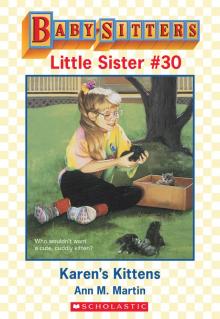 Karen's Kittens
Karen's Kittens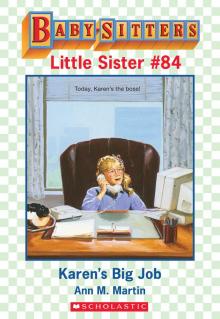 Karen's Big Job
Karen's Big Job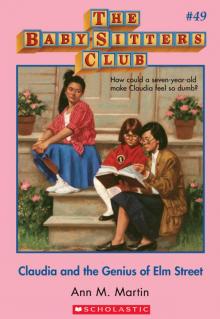 Claudia and the Genius of Elm Street
Claudia and the Genius of Elm Street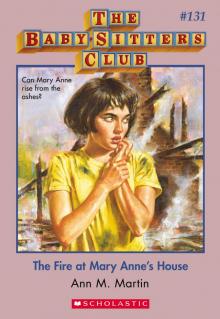 The Fire at Mary Anne's House
The Fire at Mary Anne's House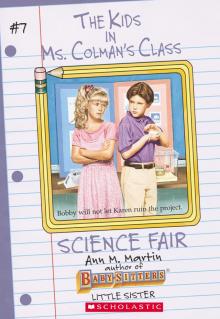 Science Fair
Science Fair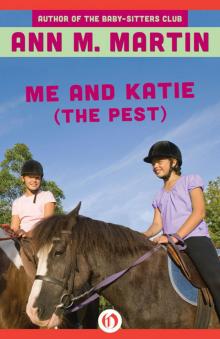 Me and Katie (The Pest)
Me and Katie (The Pest)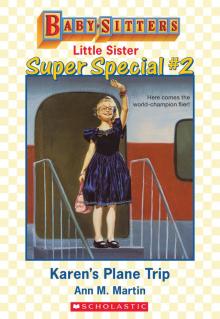 Karen's Plane Trip
Karen's Plane Trip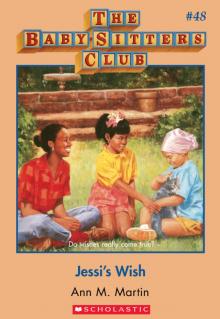 Jessi's Wish
Jessi's Wish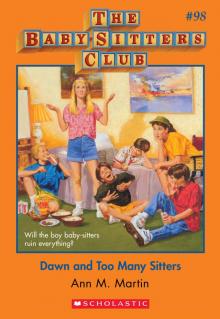 Dawn and Too Many Sitters
Dawn and Too Many Sitters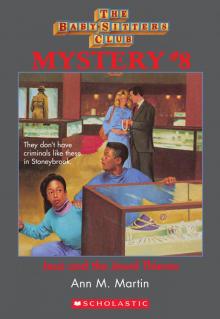 Jessi and the Jewel Thieves
Jessi and the Jewel Thieves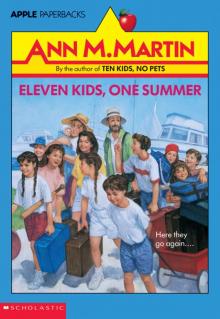 Eleven Kids, One Summer
Eleven Kids, One Summer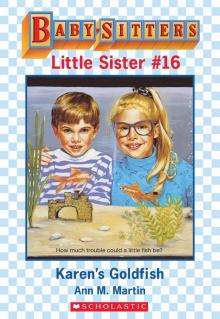 Karen's Goldfish
Karen's Goldfish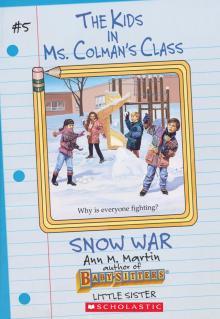 Snow War
Snow War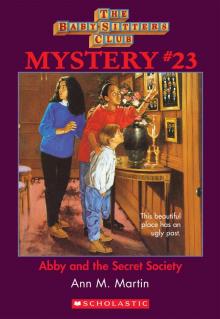 Abby and the Secret Society
Abby and the Secret Society Keeping Secrets
Keeping Secrets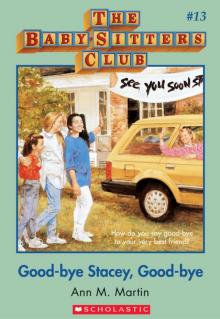 Good-Bye Stacey, Good-Bye
Good-Bye Stacey, Good-Bye Karen's Sleepover
Karen's Sleepover Claudia and the World's Cutest Baby
Claudia and the World's Cutest Baby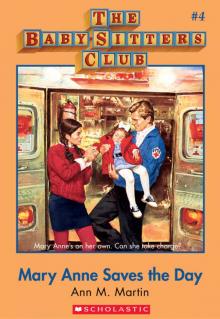 Mary Anne Saves the Day
Mary Anne Saves the Day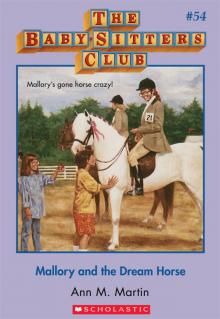 Mallory and the Dream Horse
Mallory and the Dream Horse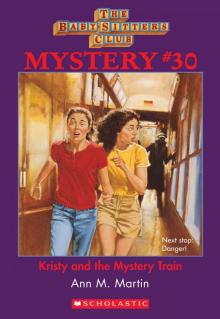 Kristy and the Mystery Train
Kristy and the Mystery Train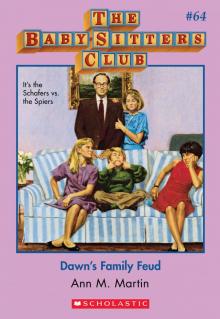 Dawn's Family Feud
Dawn's Family Feud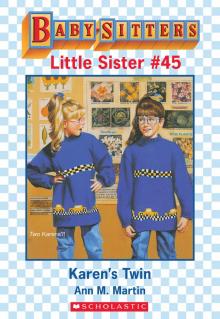 Karen's Twin
Karen's Twin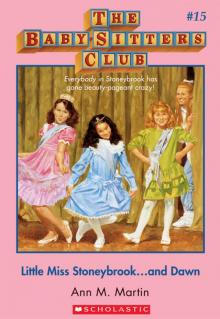 Little Miss Stoneybrook... And Dawn
Little Miss Stoneybrook... And Dawn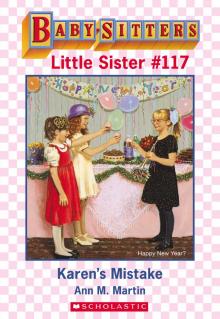 Karen's Mistake
Karen's Mistake Karen's Movie Star
Karen's Movie Star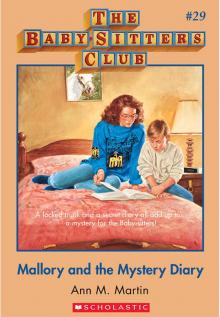 Mallory and the Mystery Diary
Mallory and the Mystery Diary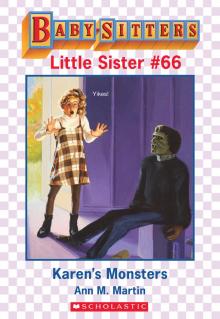 Karen's Monsters
Karen's Monsters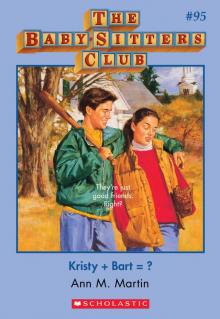 Kristy + Bart = ?
Kristy + Bart = ?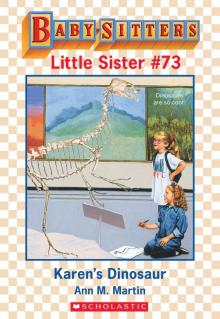 Karen's Dinosaur
Karen's Dinosaur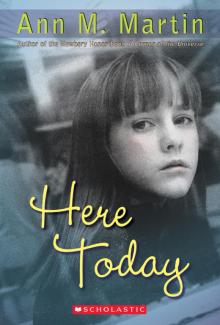 Here Today
Here Today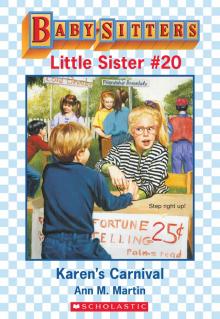 Karen's Carnival
Karen's Carnival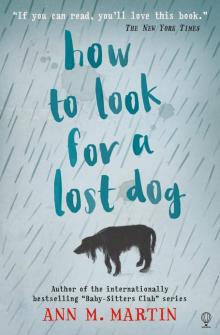 How to Look for a Lost Dog
How to Look for a Lost Dog Stacey vs. Claudia
Stacey vs. Claudia Stacey's Ex-Boyfriend
Stacey's Ex-Boyfriend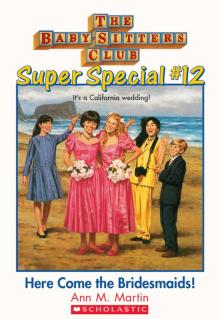 Here Come the Bridesmaids!
Here Come the Bridesmaids! Graduation Day
Graduation Day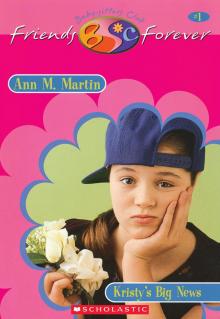 Kristy's Big News
Kristy's Big News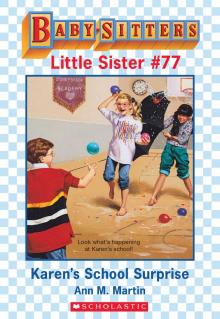 Karen's School Surprise
Karen's School Surprise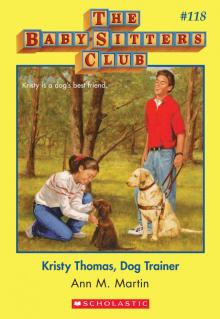 Kristy Thomas, Dog Trainer
Kristy Thomas, Dog Trainer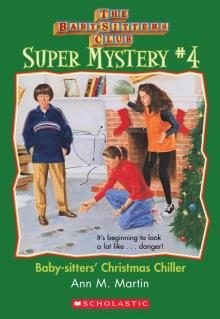 Baby-Sitters' Christmas Chiller
Baby-Sitters' Christmas Chiller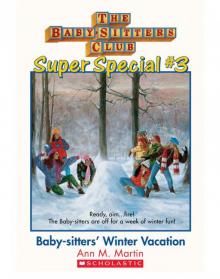 Baby-Sitters' Winter Vacation
Baby-Sitters' Winter Vacation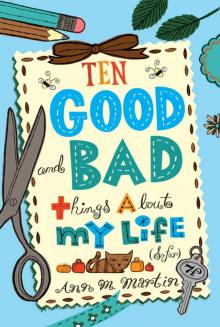 Ten Good and Bad Things About My Life
Ten Good and Bad Things About My Life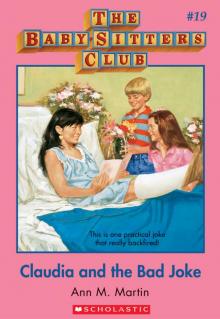 Claudia and the Bad Joke
Claudia and the Bad Joke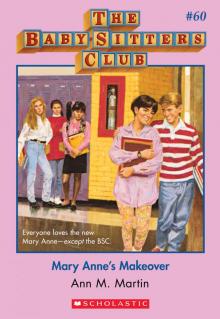 Mary Anne's Makeover
Mary Anne's Makeover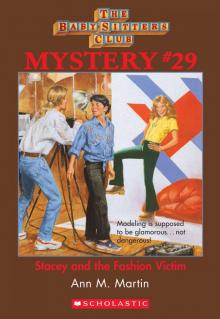 Stacey and the Fashion Victim
Stacey and the Fashion Victim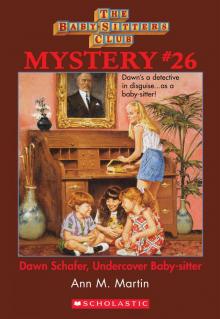 Dawn Schafer, Undercover Baby-Sitter
Dawn Schafer, Undercover Baby-Sitter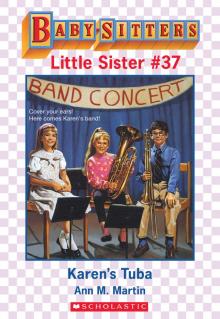 Karen's Tuba
Karen's Tuba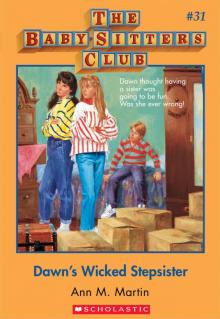 Dawn's Wicked Stepsister
Dawn's Wicked Stepsister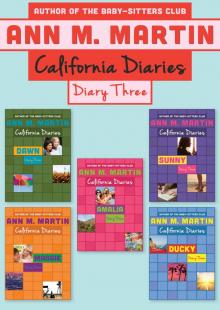 Diary Three: Dawn, Sunny, Maggie, Amalia, and Ducky
Diary Three: Dawn, Sunny, Maggie, Amalia, and Ducky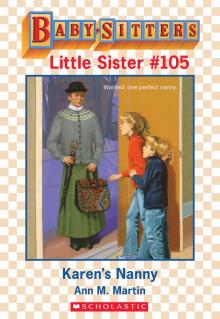 Karen's Nanny
Karen's Nanny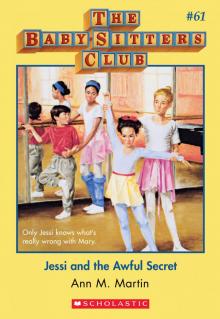 Jessi and the Awful Secret
Jessi and the Awful Secret Karen's New Year
Karen's New Year Karen's Candy
Karen's Candy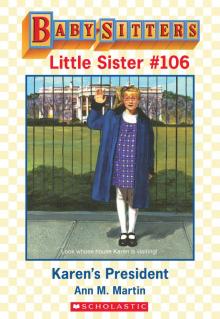 Karen's President
Karen's President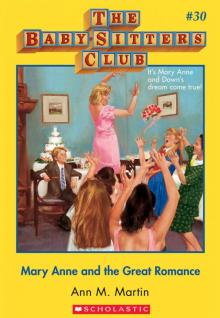 Mary Anne and the Great Romance
Mary Anne and the Great Romance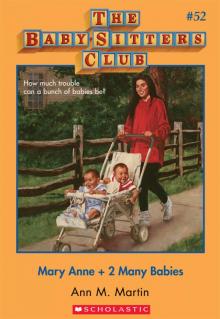 Mary Anne + 2 Many Babies
Mary Anne + 2 Many Babies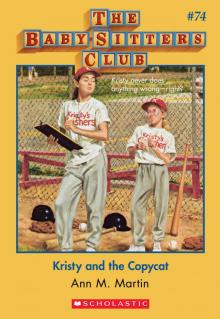 Kristy and the Copycat
Kristy and the Copycat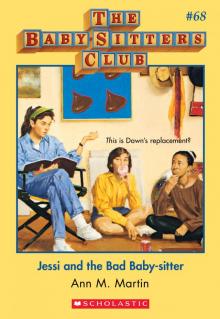 Jessi and the Bad Baby-Sitter
Jessi and the Bad Baby-Sitter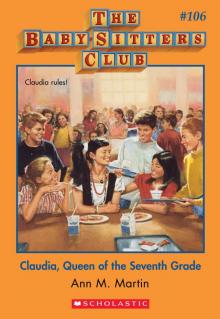 Claudia, Queen of the Seventh Grade
Claudia, Queen of the Seventh Grade Claudia and the Lighthouse Ghost
Claudia and the Lighthouse Ghost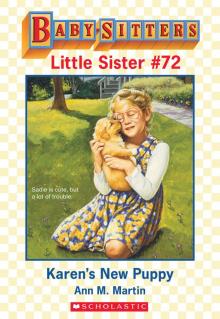 Karen's New Puppy
Karen's New Puppy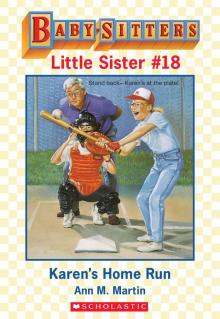 Karen's Home Run
Karen's Home Run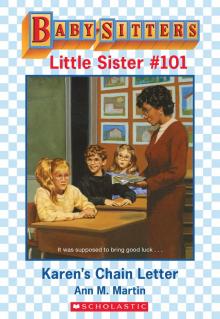 Karen's Chain Letter
Karen's Chain Letter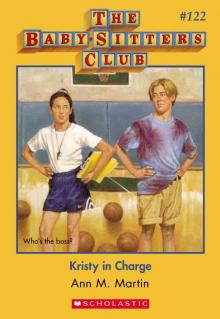 Kristy in Charge
Kristy in Charge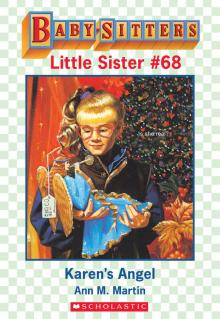 Karen's Angel
Karen's Angel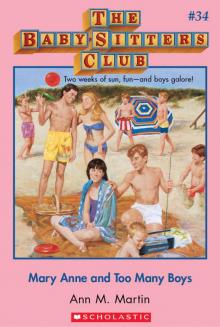 Mary Anne and Too Many Boys
Mary Anne and Too Many Boys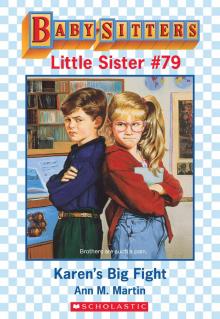 Karen's Big Fight
Karen's Big Fight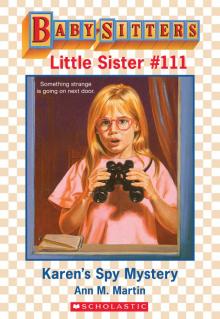 Karen's Spy Mystery
Karen's Spy Mystery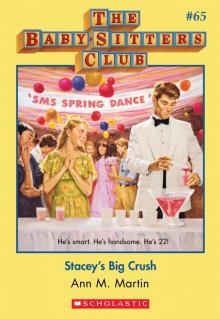 Stacey's Big Crush
Stacey's Big Crush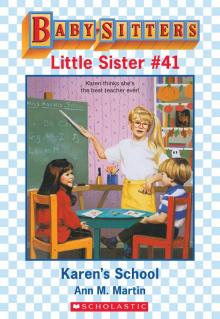 Karen's School
Karen's School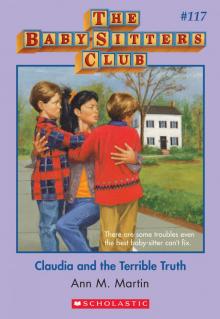 Claudia and the Terrible Truth
Claudia and the Terrible Truth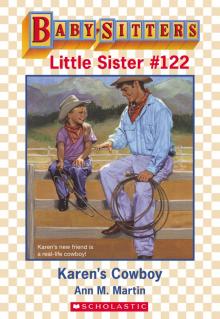 Karen's Cowboy
Karen's Cowboy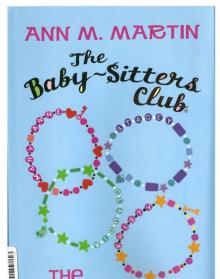 The Summer Before
The Summer Before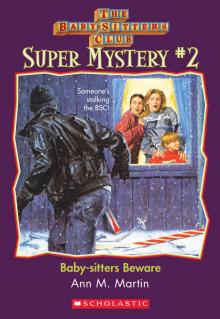 Beware, Dawn!
Beware, Dawn!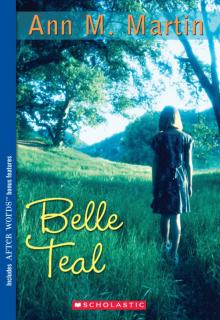 Belle Teale
Belle Teale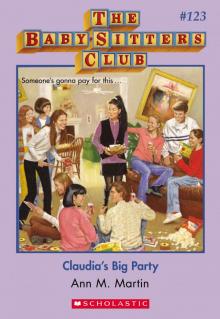 Claudia's Big Party
Claudia's Big Party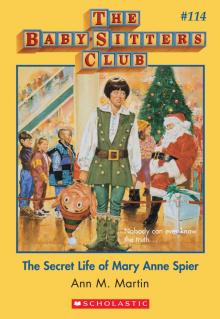 The Secret Life of Mary Anne Spier
The Secret Life of Mary Anne Spier Karen's Book
Karen's Book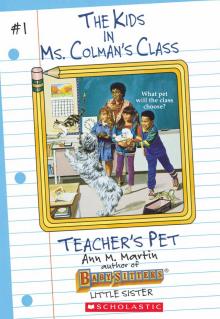 Teacher's Pet
Teacher's Pet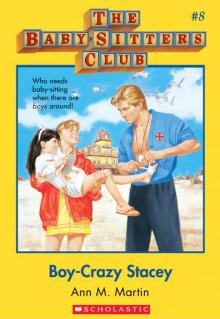 Boy-Crazy Stacey
Boy-Crazy Stacey Claudia and the Disaster Date
Claudia and the Disaster Date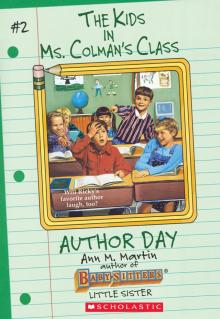 Author Day
Author Day Claudia and the Sad Good-Bye
Claudia and the Sad Good-Bye Kristy and the Worst Kid Ever
Kristy and the Worst Kid Ever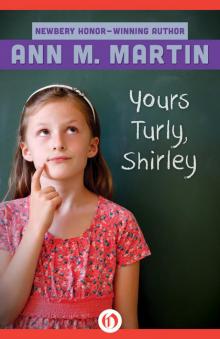 Yours Turly, Shirley
Yours Turly, Shirley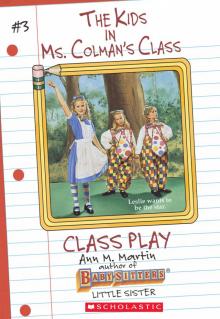 Class Play
Class Play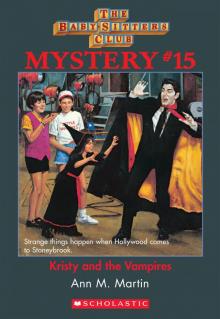 Kristy and the Vampires
Kristy and the Vampires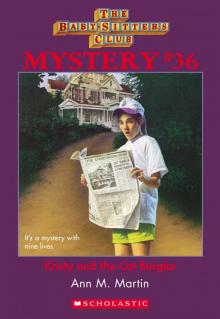 Kristy and the Cat Burglar
Kristy and the Cat Burglar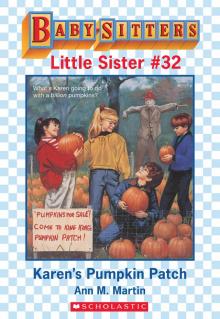 Karen's Pumpkin Patch
Karen's Pumpkin Patch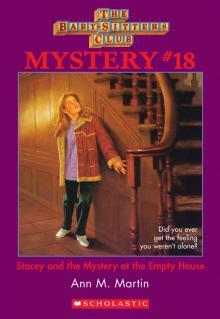 Stacey and the Mystery at the Empty House
Stacey and the Mystery at the Empty House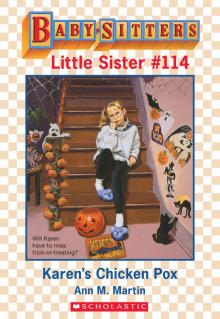 Karen's Chicken Pox
Karen's Chicken Pox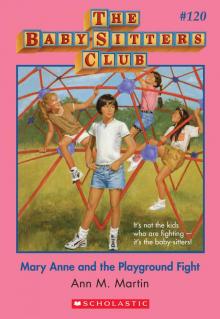 Mary Anne and the Playground Fight
Mary Anne and the Playground Fight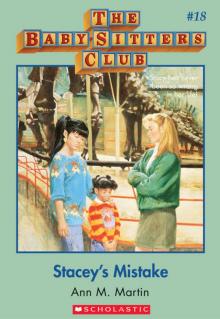 Stacey's Mistake
Stacey's Mistake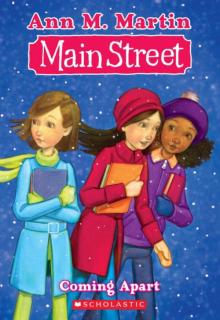 Coming Apart
Coming Apart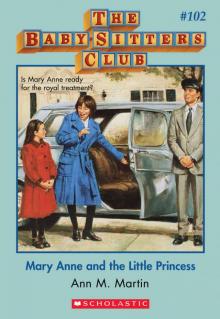 Mary Anne and the Little Princess
Mary Anne and the Little Princess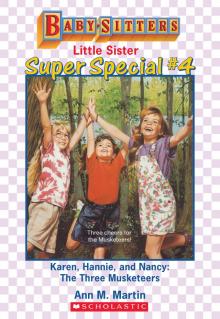 Karen, Hannie and Nancy: The Three Musketeers
Karen, Hannie and Nancy: The Three Musketeers 'Tis the Season
'Tis the Season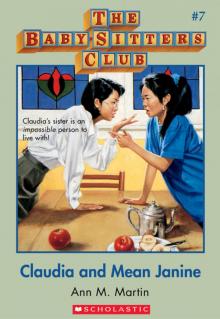 Claudia and Mean Janine
Claudia and Mean Janine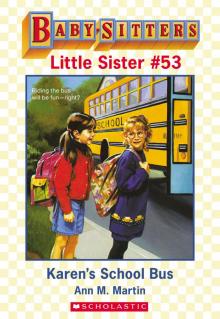 Karen's School Bus
Karen's School Bus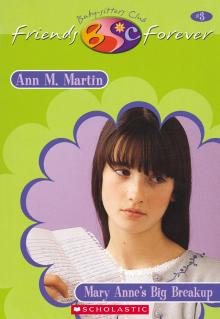 Mary Anne's Big Breakup
Mary Anne's Big Breakup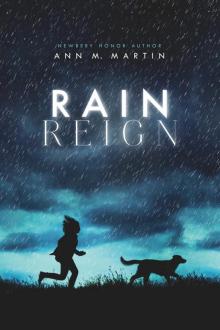 Rain Reign
Rain Reign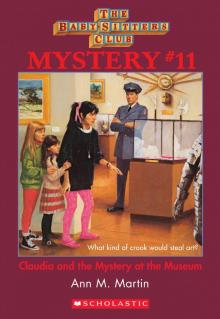 Claudia and the Mystery at the Museum
Claudia and the Mystery at the Museum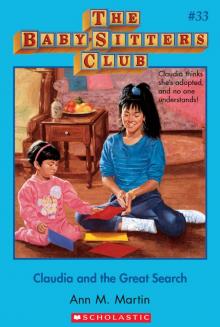 Claudia and the Great Search
Claudia and the Great Search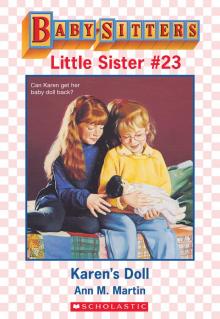 Karen's Doll
Karen's Doll Shannon's Story
Shannon's Story Sea City, Here We Come!
Sea City, Here We Come!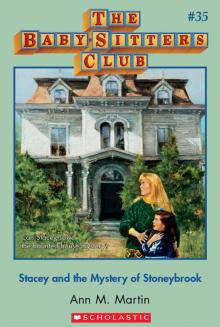 Stacey and the Mystery of Stoneybrook
Stacey and the Mystery of Stoneybrook Karen's Treasure
Karen's Treasure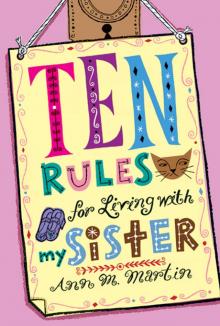 Ten Rules for Living With My Sister
Ten Rules for Living With My Sister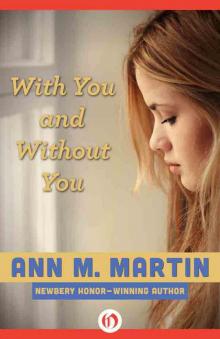 With You and Without You
With You and Without You Baby-Sitters' Island Adventure
Baby-Sitters' Island Adventure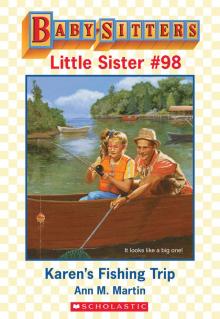 Karen's Fishing Trip
Karen's Fishing Trip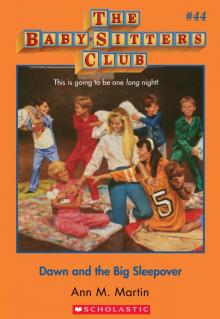 Dawn and the Big Sleepover
Dawn and the Big Sleepover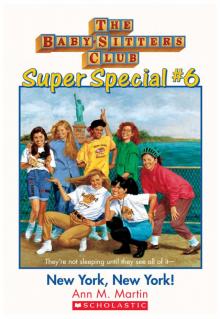 New York, New York!
New York, New York!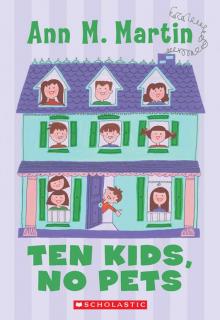 Ten Kids, No Pets
Ten Kids, No Pets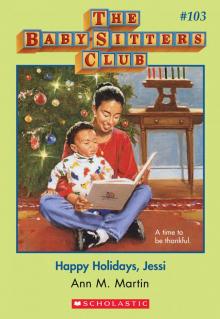 Happy Holidays, Jessi
Happy Holidays, Jessi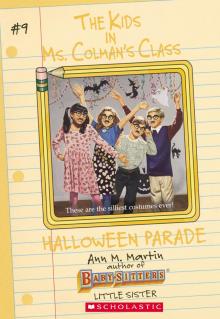 Halloween Parade
Halloween Parade Karen's New Holiday
Karen's New Holiday Kristy Power!
Kristy Power!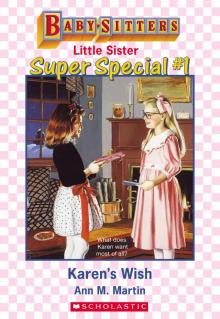 Karen's Wish
Karen's Wish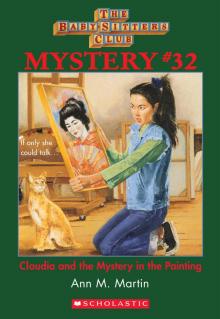 Claudia and the Mystery in the Painting
Claudia and the Mystery in the Painting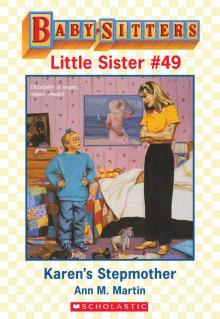 Karen's Stepmother
Karen's Stepmother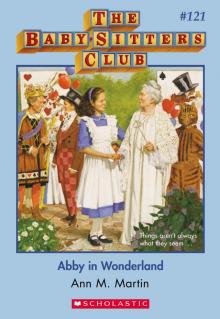 Abby in Wonderland
Abby in Wonderland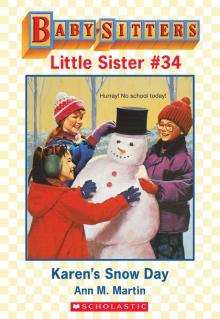 Karen's Snow Day
Karen's Snow Day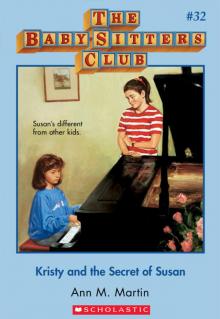 Kristy and the Secret of Susan
Kristy and the Secret of Susan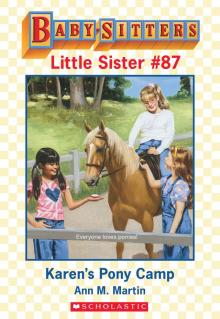 Karen's Pony Camp
Karen's Pony Camp Karen's School Trip
Karen's School Trip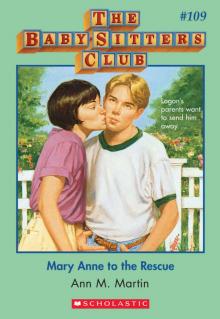 Mary Anne to the Rescue
Mary Anne to the Rescue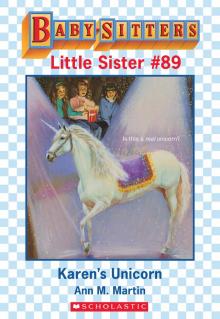 Karen's Unicorn
Karen's Unicorn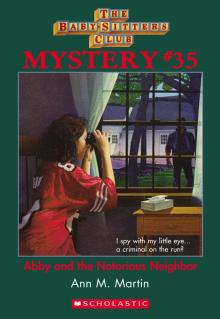 Abby and the Notorious Neighbor
Abby and the Notorious Neighbor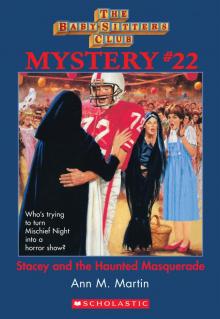 Stacey and the Haunted Masquerade
Stacey and the Haunted Masquerade Claudia Gets Her Guy
Claudia Gets Her Guy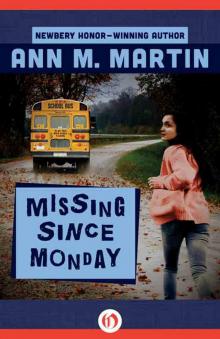 Missing Since Monday
Missing Since Monday Stacey's Choice
Stacey's Choice Stacey's Ex-Best Friend
Stacey's Ex-Best Friend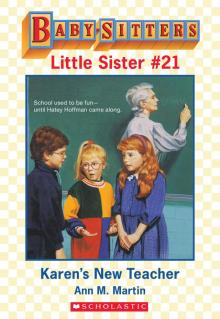 Karen's New Teacher
Karen's New Teacher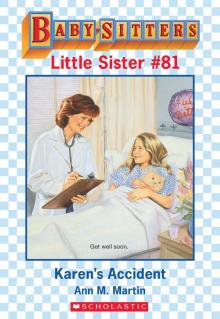 Karen's Accident
Karen's Accident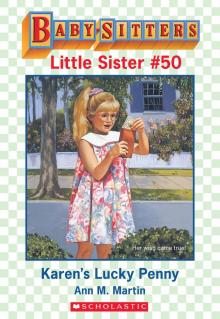 Karen's Lucky Penny
Karen's Lucky Penny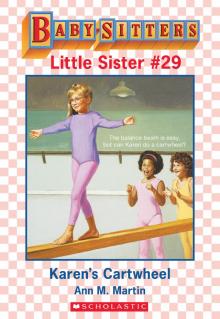 Karen's Cartwheel
Karen's Cartwheel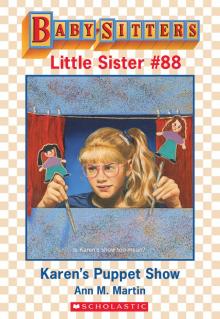 Karen's Puppet Show
Karen's Puppet Show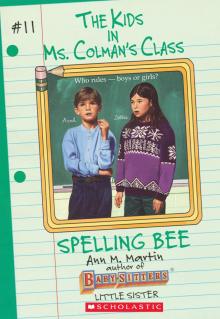 Spelling Bee
Spelling Bee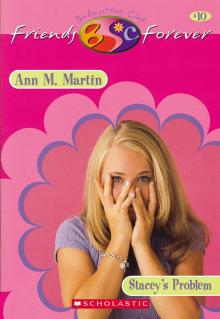 Stacey's Problem
Stacey's Problem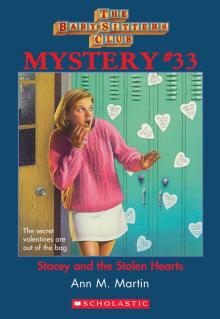 Stacey and the Stolen Hearts
Stacey and the Stolen Hearts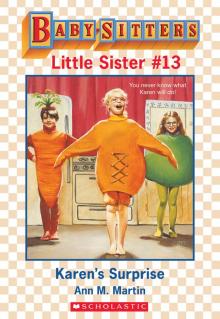 Karen's Surprise
Karen's Surprise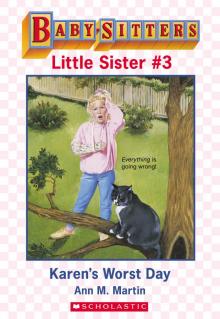 Karen's Worst Day
Karen's Worst Day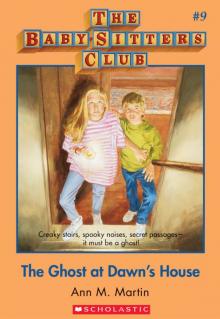 The Ghost at Dawn's House
The Ghost at Dawn's House Karen's Big Sister
Karen's Big Sister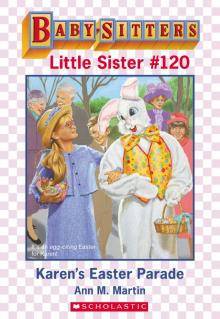 Karen's Easter Parade
Karen's Easter Parade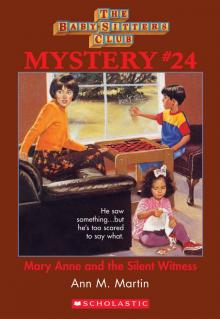 Mary Anne and the Silent Witness
Mary Anne and the Silent Witness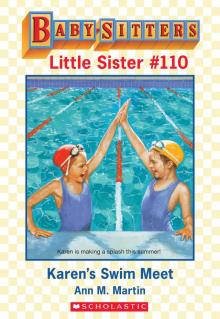 Karen's Swim Meet
Karen's Swim Meet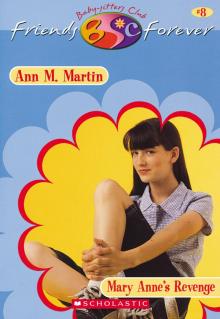 Mary Anne's Revenge
Mary Anne's Revenge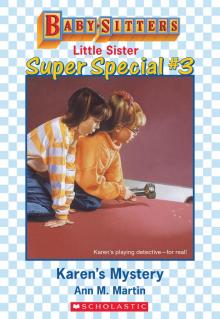 Karen's Mystery
Karen's Mystery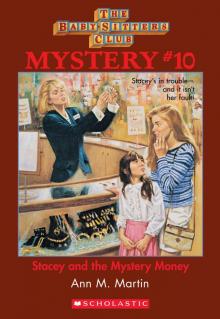 Stacey and the Mystery Money
Stacey and the Mystery Money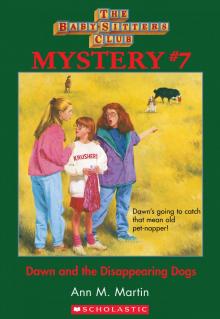 Dawn and the Disappearing Dogs
Dawn and the Disappearing Dogs Karen's Christmas Tree
Karen's Christmas Tree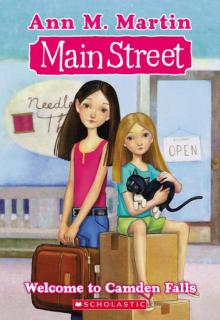 Welcome to Camden Falls
Welcome to Camden Falls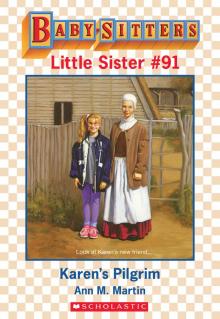 Karen's Pilgrim
Karen's Pilgrim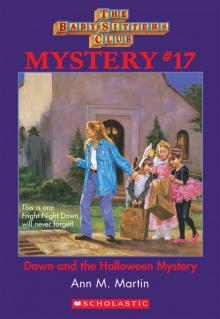 Dawn and the Halloween Mystery
Dawn and the Halloween Mystery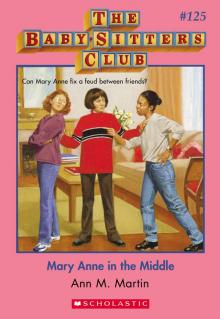 Mary Anne in the Middle
Mary Anne in the Middle Karen's Toys
Karen's Toys Kristy's Great Idea
Kristy's Great Idea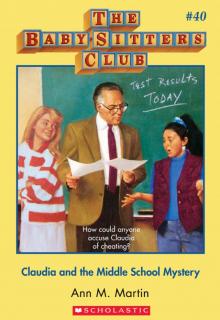 Claudia and the Middle School Mystery
Claudia and the Middle School Mystery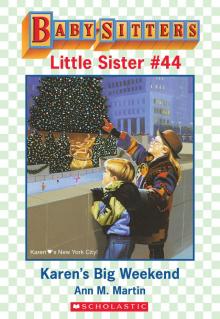 Karen's Big Weekend
Karen's Big Weekend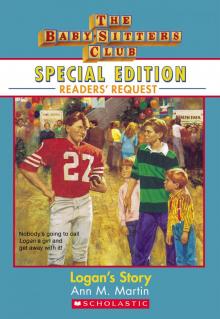 Logan's Story
Logan's Story Karen's Yo-Yo
Karen's Yo-Yo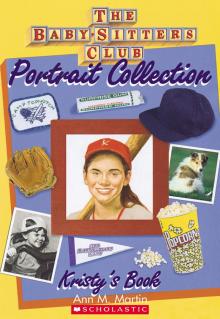 Kristy's Book
Kristy's Book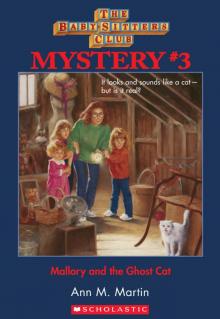 Mallory and the Ghost Cat
Mallory and the Ghost Cat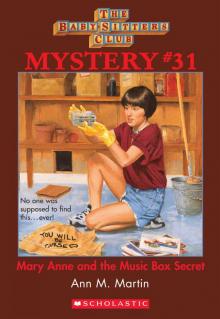 Mary Anne and the Music
Mary Anne and the Music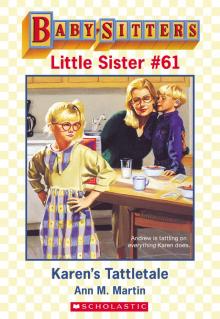 Karen's Tattletale
Karen's Tattletale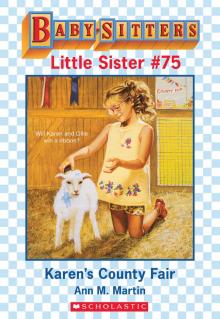 Karen's County Fair
Karen's County Fair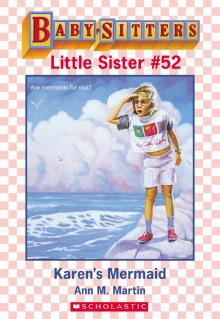 Karen's Mermaid
Karen's Mermaid Snowbound
Snowbound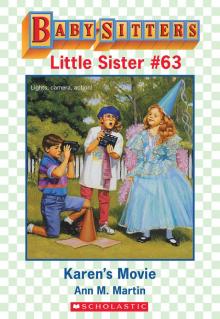 Karen's Movie
Karen's Movie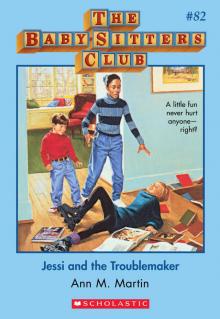 Jessi and the Troublemaker
Jessi and the Troublemaker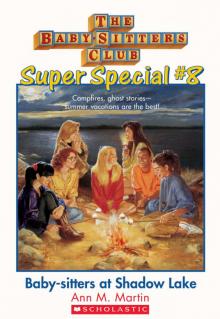 Baby-Sitters at Shadow Lake
Baby-Sitters at Shadow Lake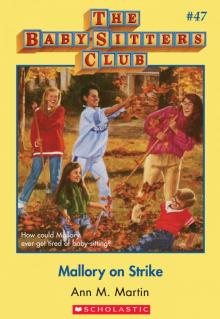 Mallory on Strike
Mallory on Strike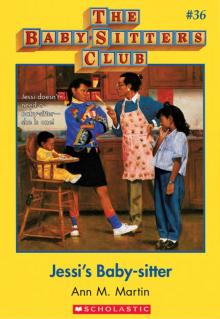 Jessi's Baby-Sitter
Jessi's Baby-Sitter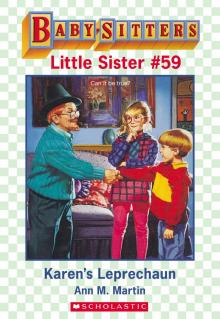 Karen's Leprechaun
Karen's Leprechaun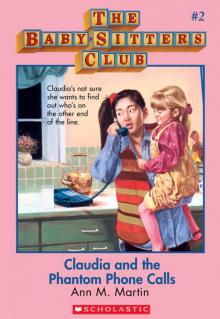 Claudia and the Phantom Phone Calls
Claudia and the Phantom Phone Calls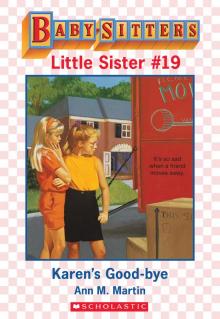 Karen's Good-Bye
Karen's Good-Bye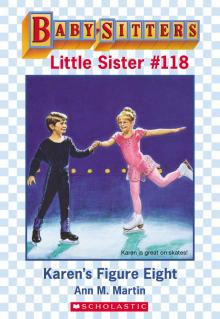 Karen's Figure Eight
Karen's Figure Eight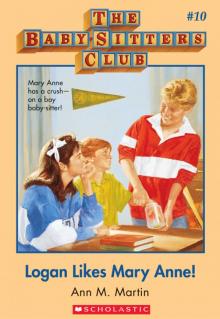 Logan Likes Mary Anne!
Logan Likes Mary Anne!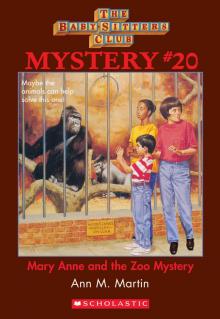 Mary Anne and the Zoo Mystery
Mary Anne and the Zoo Mystery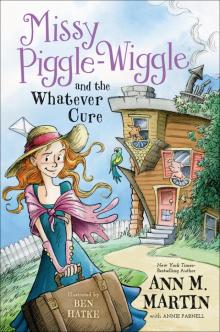 Missy Piggle-Wiggle and the Whatever Cure
Missy Piggle-Wiggle and the Whatever Cure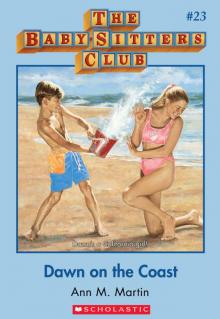 Dawn on the Coast
Dawn on the Coast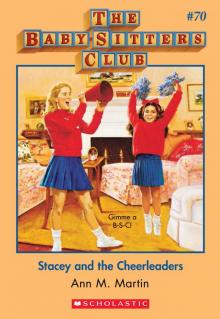 Stacey and the Cheerleaders
Stacey and the Cheerleaders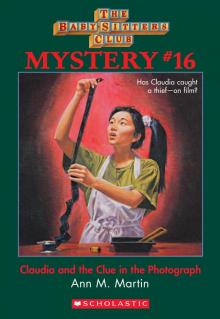 Claudia and the Clue in the Photograph
Claudia and the Clue in the Photograph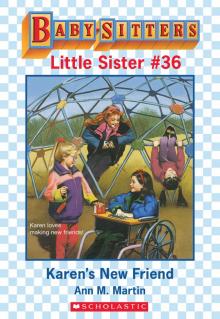 Karen's New Friend
Karen's New Friend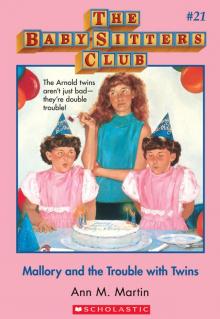 Mallory and the Trouble With Twins
Mallory and the Trouble With Twins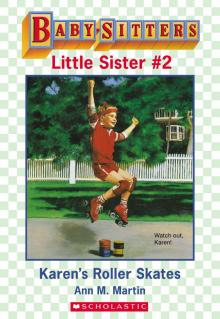 Karen's Roller Skates
Karen's Roller Skates Abby and the Best Kid Ever
Abby and the Best Kid Ever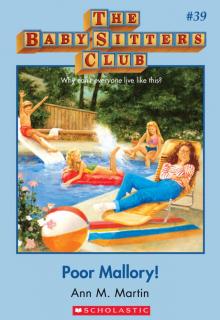 Poor Mallory!
Poor Mallory!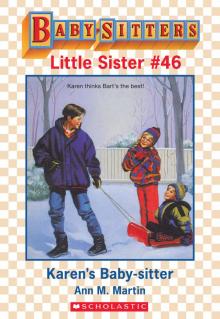 Karen's Witch
Karen's Witch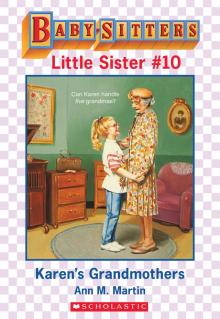 Karen's Grandmothers
Karen's Grandmothers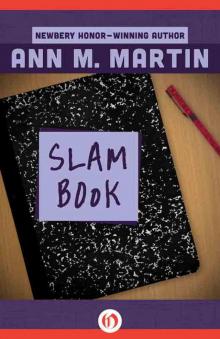 Slam Book
Slam Book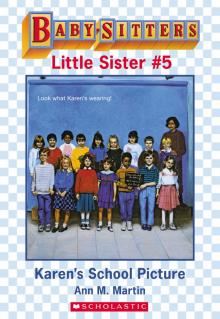 Karen's School Picture
Karen's School Picture Karen's Reindeer
Karen's Reindeer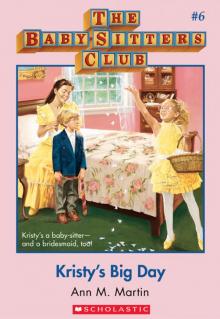 Kristy's Big Day
Kristy's Big Day The Long Way Home
The Long Way Home Karen's Sleigh Ride
Karen's Sleigh Ride On Christmas Eve
On Christmas Eve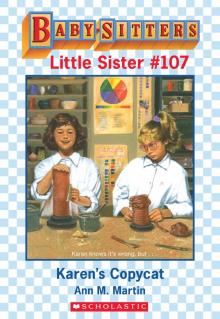 Karen's Copycat
Karen's Copycat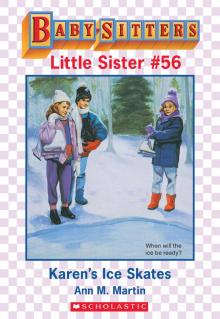 Karen's Ice Skates
Karen's Ice Skates Claudia and the Little Liar
Claudia and the Little Liar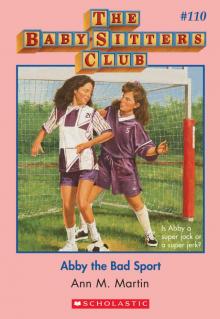 Abby the Bad Sport
Abby the Bad Sport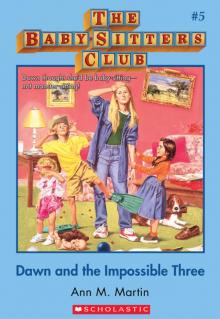 The Baby-Sitters Club #5: Dawn and the Impossible Three
The Baby-Sitters Club #5: Dawn and the Impossible Three Abby's Book
Abby's Book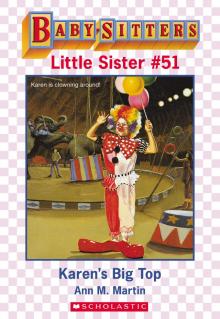 Karen's Big Top
Karen's Big Top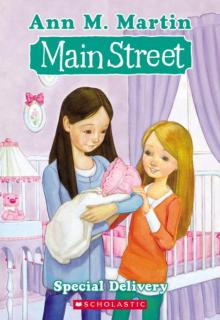 Main Street #8: Special Delivery
Main Street #8: Special Delivery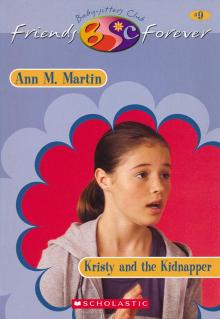 Kristy and the Kidnapper
Kristy and the Kidnapper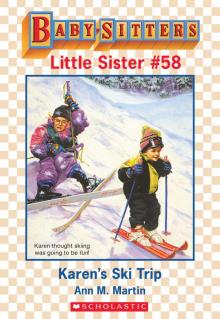 Karen's Ski Trip
Karen's Ski Trip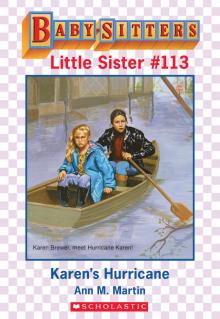 Karen's Hurricane
Karen's Hurricane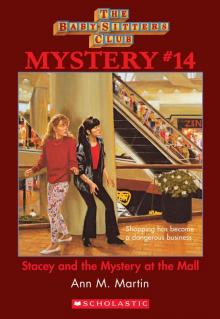 Stacey and the Mystery at the Mall
Stacey and the Mystery at the Mall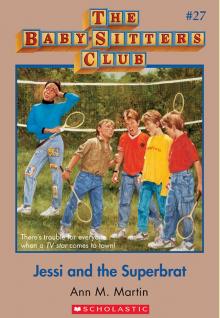 Jessi and the Superbrat
Jessi and the Superbrat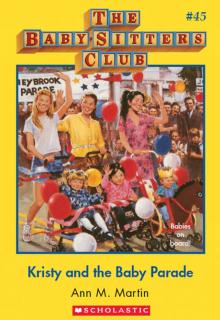 Kristy and the Baby Parade
Kristy and the Baby Parade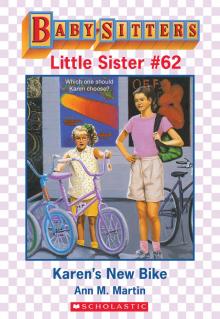 Karen's New Bike
Karen's New Bike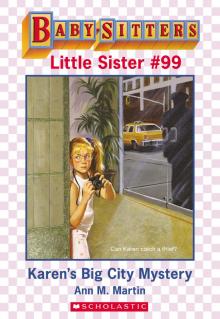 Karen's Big City Mystery
Karen's Big City Mystery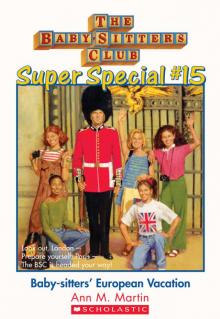 Baby-Sitters' European Vacation
Baby-Sitters' European Vacation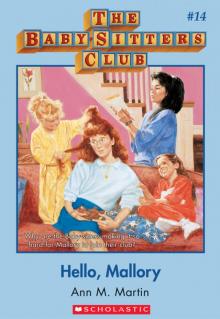 Hello, Mallory
Hello, Mallory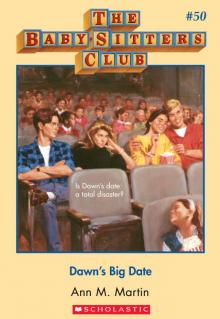 Dawn's Big Date
Dawn's Big Date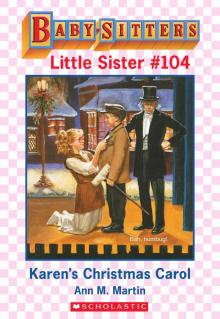 Karen's Christmas Carol
Karen's Christmas Carol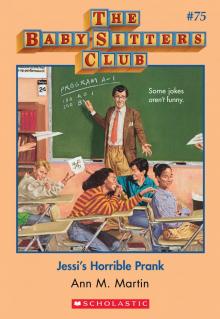 Jessi's Horrible Prank
Jessi's Horrible Prank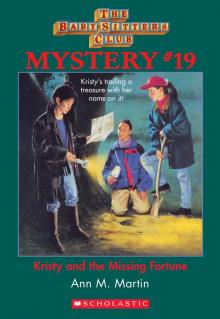 Kristy and the Missing Fortune
Kristy and the Missing Fortune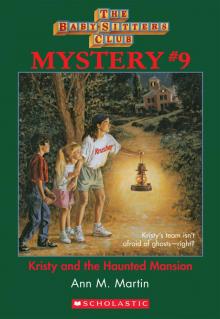 Kristy and the Haunted Mansion
Kristy and the Haunted Mansion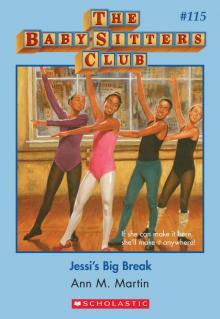 Jessi's Big Break
Jessi's Big Break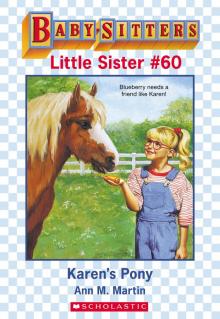 Karen's Pony
Karen's Pony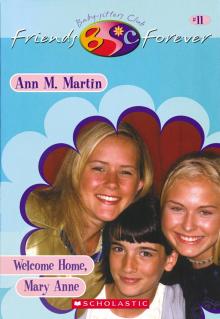 Welcome Home, Mary Anne
Welcome Home, Mary Anne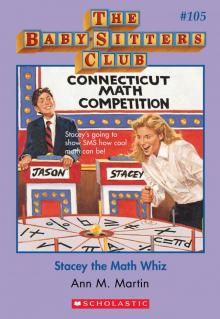 Stacey the Math Whiz
Stacey the Math Whiz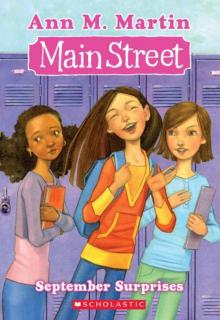 September Surprises
September Surprises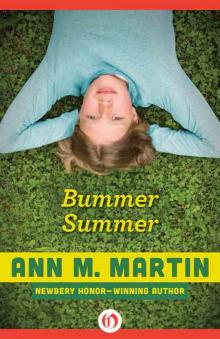 Bummer Summer
Bummer Summer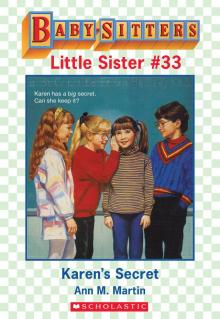 Karen's Secret
Karen's Secret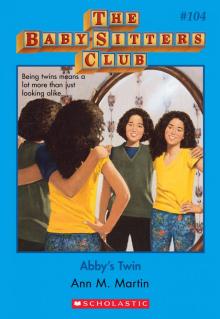 Abby's Twin
Abby's Twin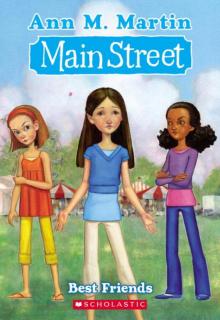 Main Street #4: Best Friends
Main Street #4: Best Friends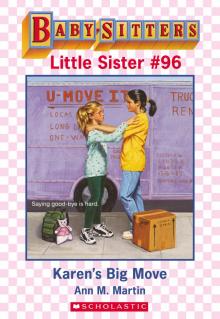 Karen's Big Move
Karen's Big Move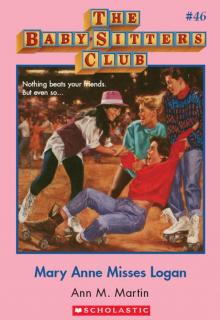 Mary Anne Misses Logan
Mary Anne Misses Logan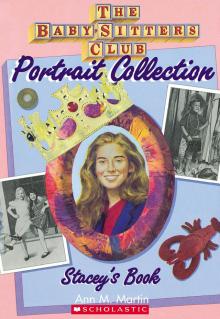 Stacey's Book
Stacey's Book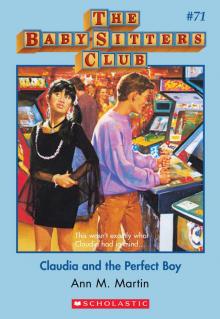 Claudia and the Perfect Boy
Claudia and the Perfect Boy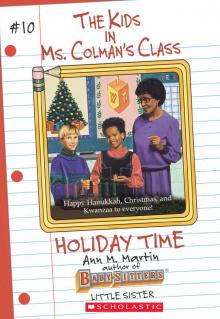 Holiday Time
Holiday Time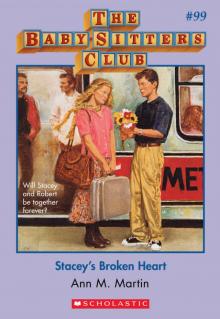 Stacey's Broken Heart
Stacey's Broken Heart Karen's Field Day
Karen's Field Day Kristy's Worst Idea
Kristy's Worst Idea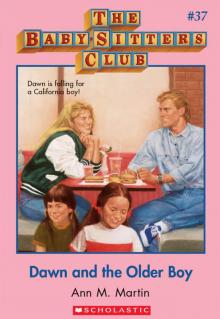 Dawn and the Older Boy
Dawn and the Older Boy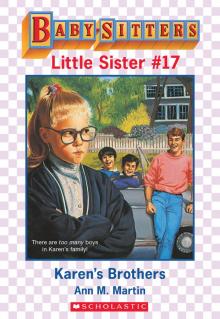 Karen's Brothers
Karen's Brothers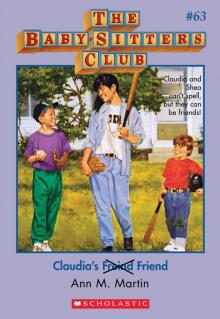 Claudia's Friend
Claudia's Friend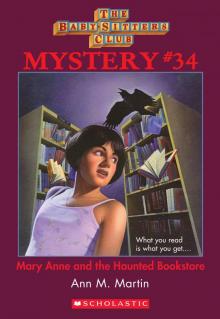 Mary Anne and the Haunted Bookstore
Mary Anne and the Haunted Bookstore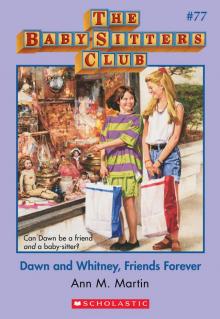 Dawn and Whitney, Friends Forever
Dawn and Whitney, Friends Forever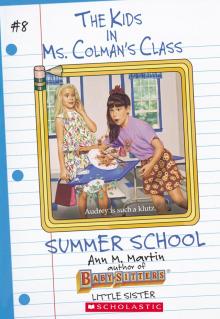 Summer School
Summer School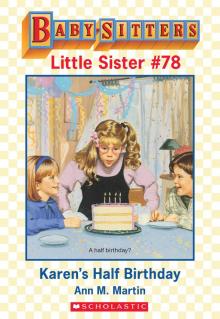 Karen's Birthday
Karen's Birthday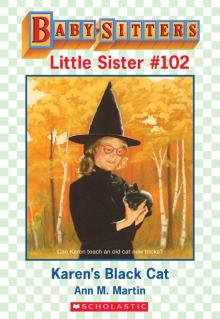 Karen's Black Cat
Karen's Black Cat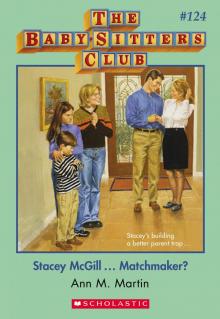 Stacey McGill... Matchmaker?
Stacey McGill... Matchmaker? Claudia's Book
Claudia's Book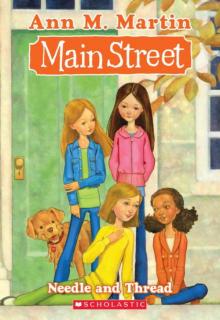 Main Street #2: Needle and Thread
Main Street #2: Needle and Thread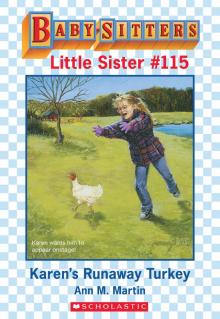 Karen's Runaway Turkey
Karen's Runaway Turkey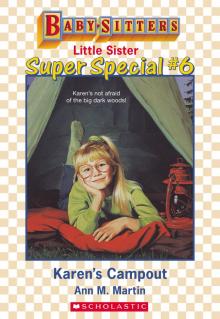 Karen's Campout
Karen's Campout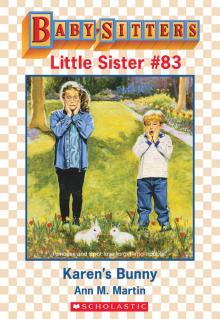 Karen's Bunny
Karen's Bunny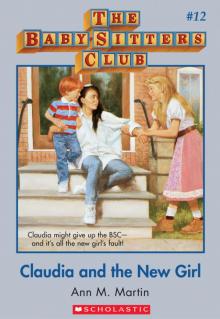 Claudia and the New Girl
Claudia and the New Girl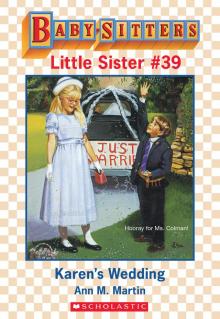 Karen's Wedding
Karen's Wedding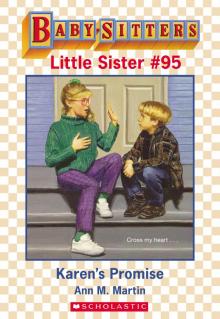 Karen's Promise
Karen's Promise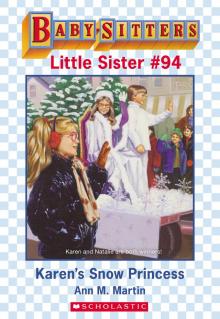 Karen's Snow Princess
Karen's Snow Princess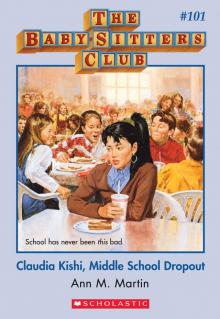 Claudia Kishi, Middle School Dropout
Claudia Kishi, Middle School Dropout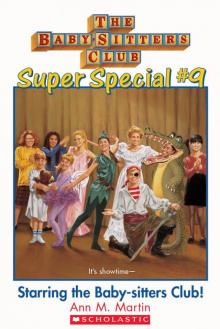 Starring the Baby-Sitters Club!
Starring the Baby-Sitters Club!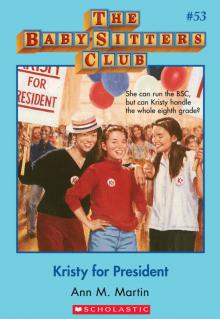 Kristy for President
Kristy for President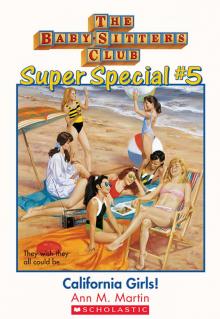 California Girls!
California Girls!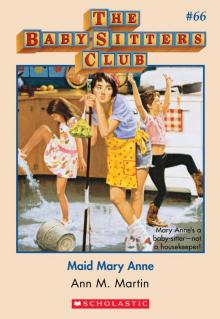 Maid Mary Anne
Maid Mary Anne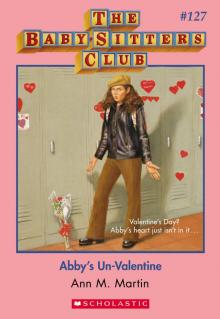 Abby's Un-Valentine
Abby's Un-Valentine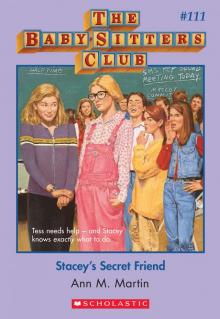 Stacey's Secret Friend
Stacey's Secret Friend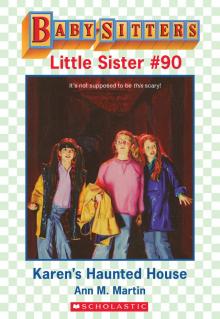 Karen's Haunted House
Karen's Haunted House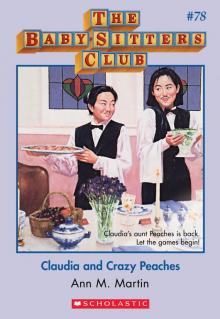 Claudia and Crazy Peaches
Claudia and Crazy Peaches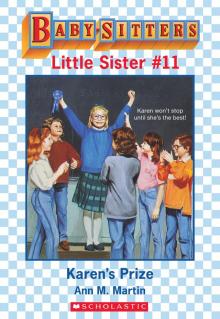 Karen's Prize
Karen's Prize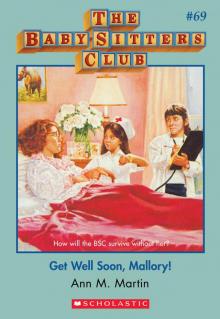 Get Well Soon, Mallory!
Get Well Soon, Mallory!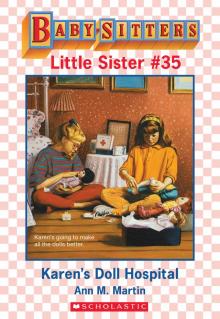 Karen's Doll Hospital
Karen's Doll Hospital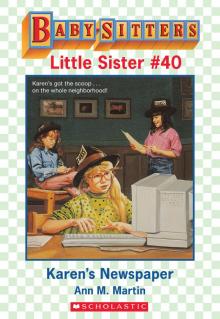 Karen's Newspaper
Karen's Newspaper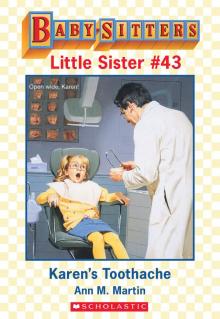 Karen's Toothache
Karen's Toothache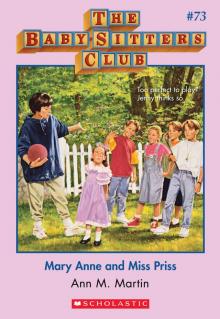 Mary Anne and Miss Priss
Mary Anne and Miss Priss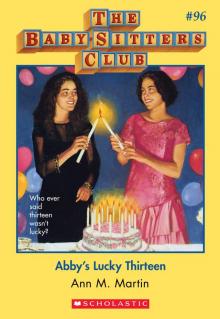 Abby's Lucky Thirteen
Abby's Lucky Thirteen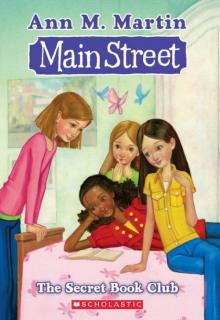 The Secret Book Club
The Secret Book Club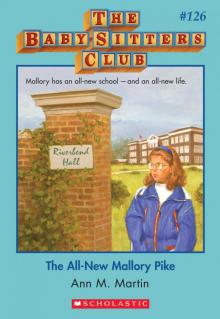 The All-New Mallory Pike
The All-New Mallory Pike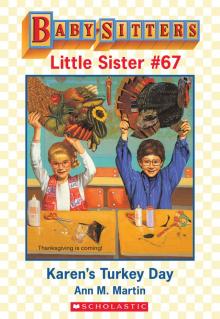 Karen's Turkey Day
Karen's Turkey Day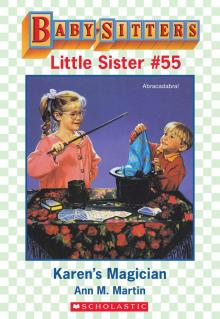 Karen's Magician
Karen's Magician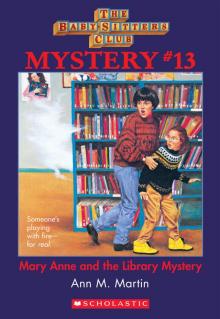 Mary Anne and the Library Mystery
Mary Anne and the Library Mystery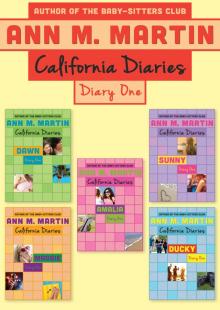 Diary One: Dawn, Sunny, Maggie, Amalia, and Ducky
Diary One: Dawn, Sunny, Maggie, Amalia, and Ducky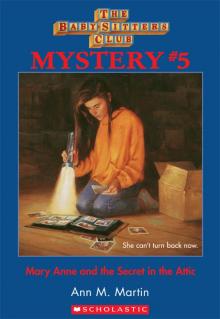 Mary Anne and the Secret in the Attic
Mary Anne and the Secret in the Attic Kristy and the Mother's Day Surprise
Kristy and the Mother's Day Surprise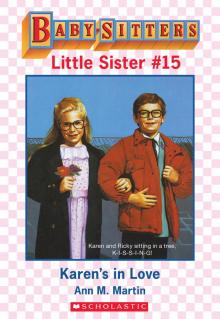 Karen's in Love
Karen's in Love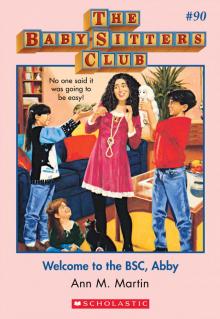 Welcome to the BSC, Abby
Welcome to the BSC, Abby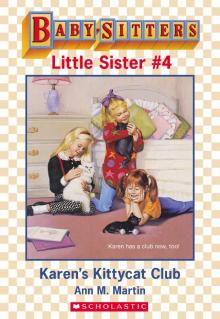 Karen's Kittycat Club
Karen's Kittycat Club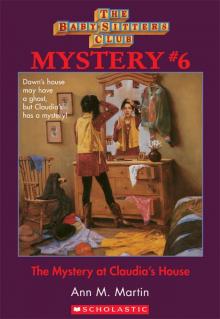 The Mystery at Claudia's House
The Mystery at Claudia's House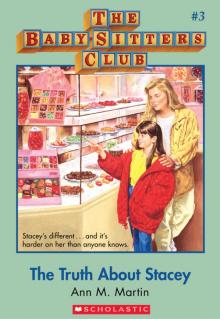 The Truth About Stacey
The Truth About Stacey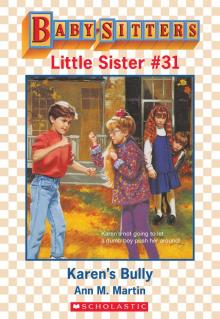 Karen's Bully
Karen's Bully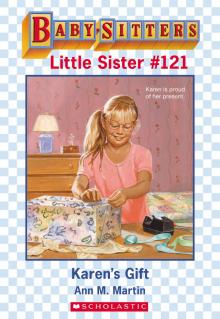 Karen's Gift
Karen's Gift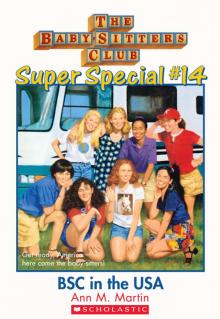 BSC in the USA
BSC in the USA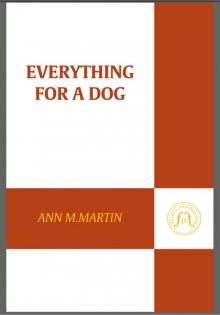 Everything for a Dog
Everything for a Dog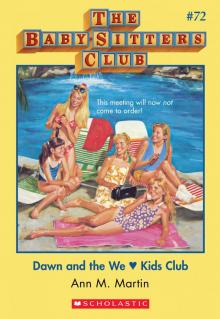 Dawn and the We Love Kids Club
Dawn and the We Love Kids Club Karen's Ghost
Karen's Ghost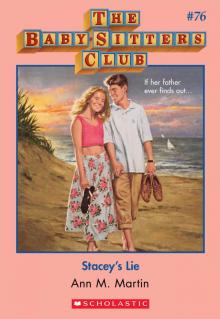 Stacey's Lie
Stacey's Lie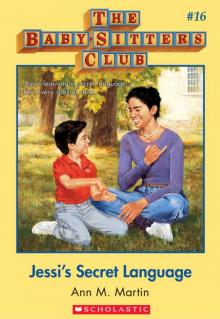 Jessi's Secret Language
Jessi's Secret Language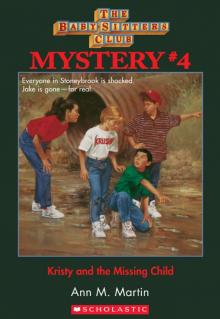 Kristy and the Missing Child
Kristy and the Missing Child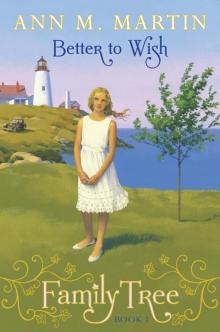 Better to Wish
Better to Wish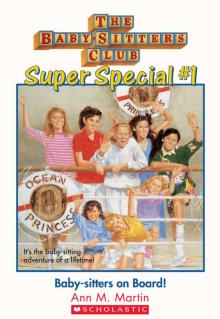 Baby-Sitters on Board!
Baby-Sitters on Board!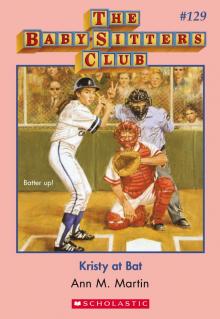 Kristy at Bat
Kristy at Bat Everything Changes
Everything Changes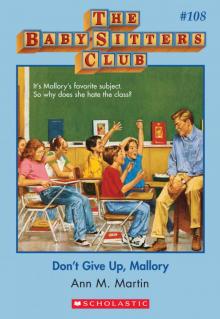 Don't Give Up, Mallory
Don't Give Up, Mallory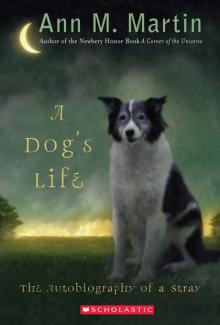 A Dog's Life: The Autobiography of a Stray
A Dog's Life: The Autobiography of a Stray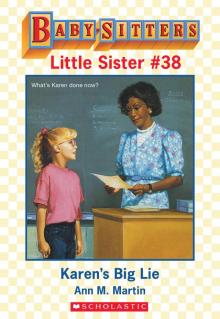 Karen's Big Lie
Karen's Big Lie Karen's Show and Share
Karen's Show and Share Mallory Hates Boys (and Gym)
Mallory Hates Boys (and Gym)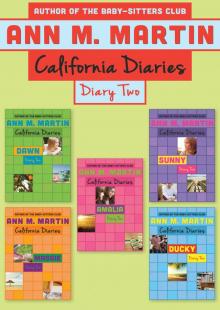 Diary Two: Dawn, Sunny, Maggie, Amalia, and Ducky
Diary Two: Dawn, Sunny, Maggie, Amalia, and Ducky Karen's Pen Pal
Karen's Pen Pal Claudia and the Friendship Feud
Claudia and the Friendship Feud Karen's Secret Valentine
Karen's Secret Valentine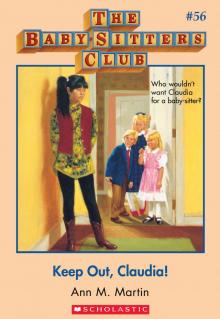 Keep Out, Claudia!
Keep Out, Claudia! Aloha, Baby-Sitters!
Aloha, Baby-Sitters!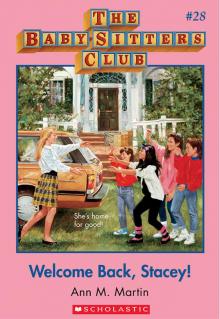 Welcome Back, Stacey
Welcome Back, Stacey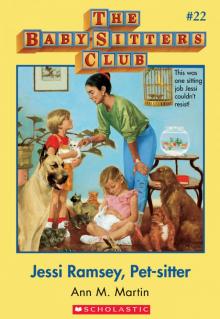 Jessi Ramsey, Pet-Sitter
Jessi Ramsey, Pet-Sitter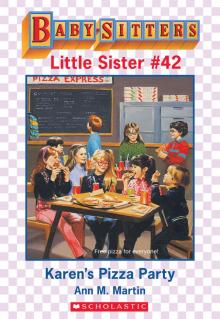 Karen's Pizza Party
Karen's Pizza Party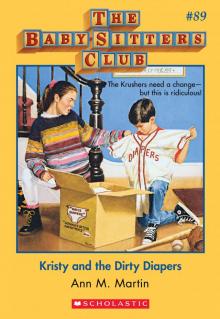 Kristy and the Dirty Diapers
Kristy and the Dirty Diapers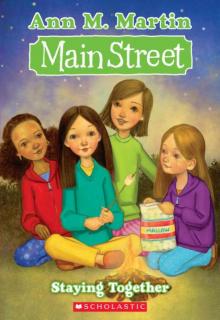 Staying Together
Staying Together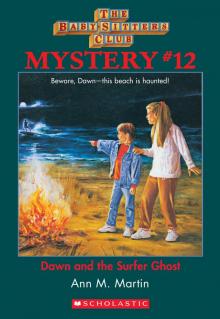 Dawn and the Surfer Ghost
Dawn and the Surfer Ghost Claudia Makes Up Her Mind
Claudia Makes Up Her Mind Jessi's Gold Medal
Jessi's Gold Medal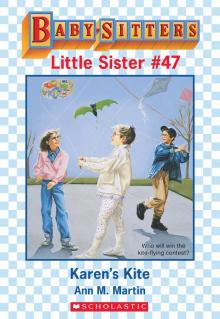 Karen's Kite
Karen's Kite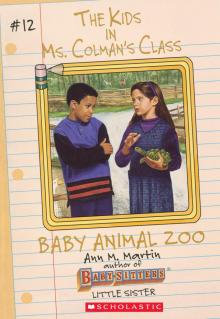 Baby Animal Zoo
Baby Animal Zoo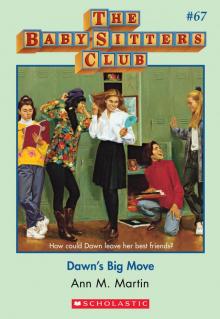 Dawn's Big Move
Dawn's Big Move Karen's Big Joke
Karen's Big Joke Karen's Lemonade Stand
Karen's Lemonade Stand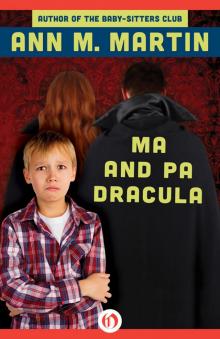 Ma and Pa Dracula
Ma and Pa Dracula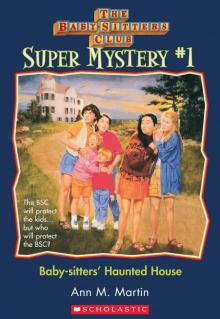 Baby-Sitters' Haunted House
Baby-Sitters' Haunted House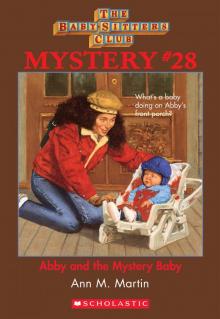 Abby and the Mystery Baby
Abby and the Mystery Baby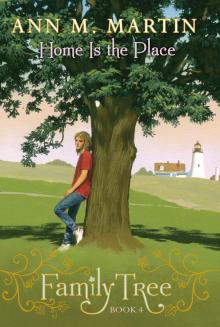 Home Is the Place
Home Is the Place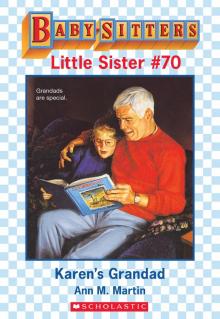 Karen's Grandad
Karen's Grandad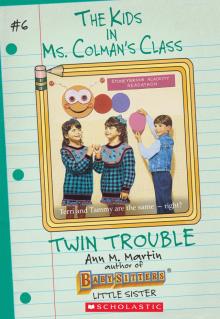 Twin Trouble
Twin Trouble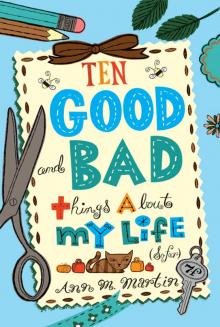 Ten Good and Bad Things About My Life (So Far)
Ten Good and Bad Things About My Life (So Far)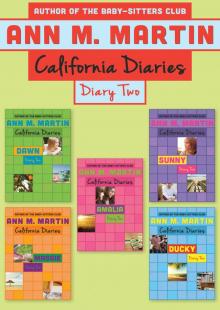 Diary Two
Diary Two Baby-Sitters Club 027
Baby-Sitters Club 027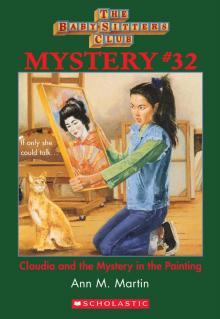 Claudia and the Mystery Painting
Claudia and the Mystery Painting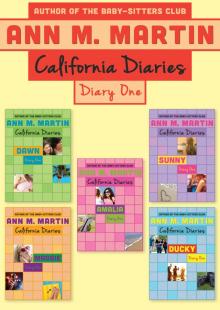 Diary One
Diary One Baby-Sitters Club 037
Baby-Sitters Club 037 Baby-Sitters Club 028
Baby-Sitters Club 028 Baby-Sitters Club 085
Baby-Sitters Club 085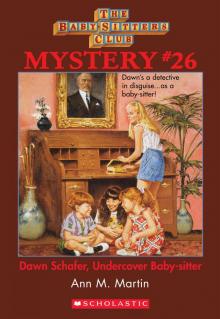 Dawn Schaffer Undercover Baby-Sitter
Dawn Schaffer Undercover Baby-Sitter Jessi's Babysitter
Jessi's Babysitter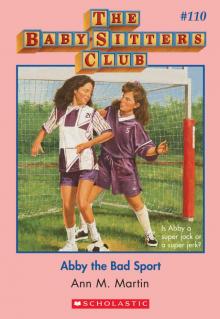 The Baby-Sitters Club #110: Abby the Bad Sport (Baby-Sitters Club, The)
The Baby-Sitters Club #110: Abby the Bad Sport (Baby-Sitters Club, The) Karen's Little Sister
Karen's Little Sister Baby-Sitters Club 058
Baby-Sitters Club 058 Claudia And The Genius On Elm St.
Claudia And The Genius On Elm St.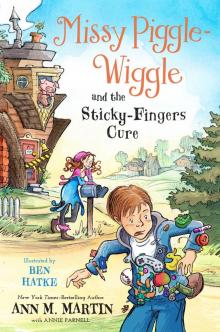 Missy Piggle-Wiggle and the Sticky-Fingers Cure
Missy Piggle-Wiggle and the Sticky-Fingers Cure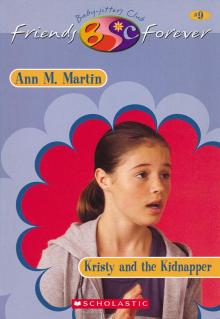 Kristy and Kidnapper
Kristy and Kidnapper Baby-Sitters Club 041
Baby-Sitters Club 041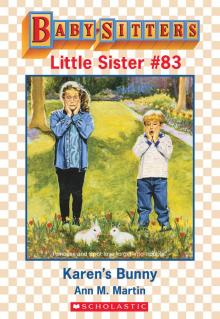 Karen's Bunny Trouble
Karen's Bunny Trouble Baby-Sitters Club 032
Baby-Sitters Club 032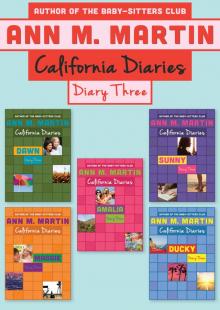 Diary Three
Diary Three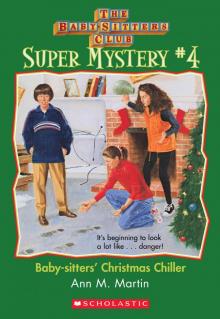 Christmas Chiller
Christmas Chiller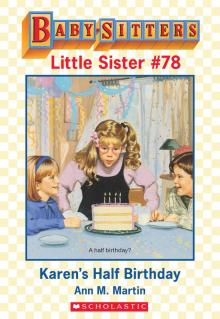 Karen's Half-Birthday
Karen's Half-Birthday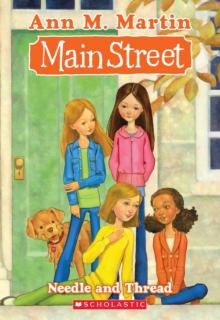 Needle and Thread
Needle and Thread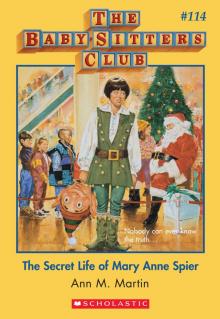 Secret Life of Mary Anne Spier
Secret Life of Mary Anne Spier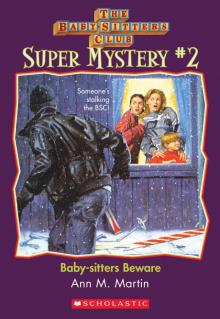 Baby-Sitters Beware
Baby-Sitters Beware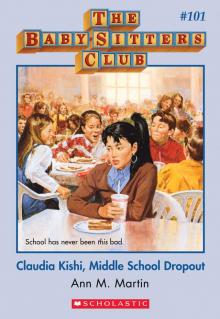 Claudia Kishi, Middle School Drop-Out
Claudia Kishi, Middle School Drop-Out Logan Likes Mary Anne !
Logan Likes Mary Anne ! Baby-Sitters Club 061
Baby-Sitters Club 061 Best Friends
Best Friends Baby-Sitters Club 031
Baby-Sitters Club 031 Karen's Little Witch
Karen's Little Witch Jessi Ramsey, Petsitter
Jessi Ramsey, Petsitter Baby-Sitters Club 123
Baby-Sitters Club 123 Baby-Sitters Club 059
Baby-Sitters Club 059 Baby-Sitters Club 033
Baby-Sitters Club 033 Baby-Sitters Club 060
Baby-Sitters Club 060 Baby-Sitters Club 094
Baby-Sitters Club 094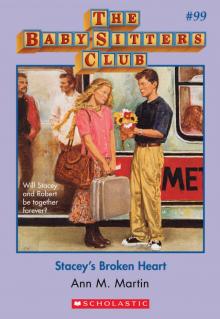 The Baby-Sitters Club #99: Stacey's Broken Heart
The Baby-Sitters Club #99: Stacey's Broken Heart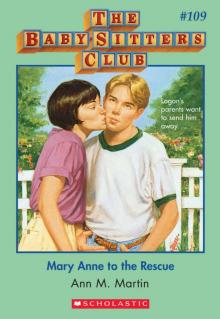 The Baby-Sitters Club #109: Mary Anne to the Rescue (Baby-Sitters Club, The)
The Baby-Sitters Club #109: Mary Anne to the Rescue (Baby-Sitters Club, The) Mystery At Claudia's House
Mystery At Claudia's House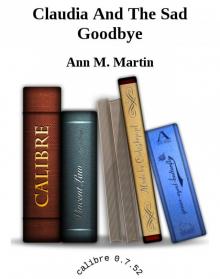 Claudia And The Sad Goodbye
Claudia And The Sad Goodbye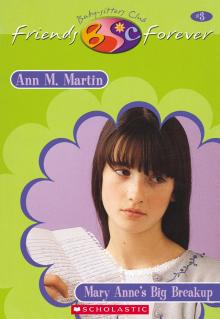 Mary Anne's Big Break-Up
Mary Anne's Big Break-Up Baby-Sitters Club 025
Baby-Sitters Club 025 Baby-Sitters Club 042
Baby-Sitters Club 042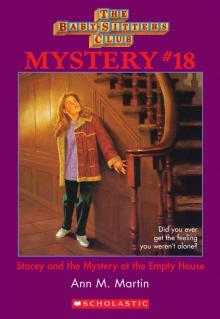 Stacey and the Mystery of the Empty House
Stacey and the Mystery of the Empty House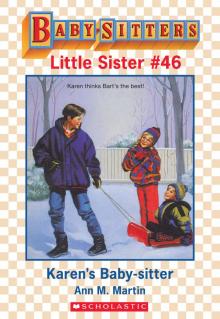 Karen's Baby-Sitter
Karen's Baby-Sitter Claudia's Friendship Feud
Claudia's Friendship Feud Baby-Sitters Club 090
Baby-Sitters Club 090 Baby-Sitters Club 021
Baby-Sitters Club 021 Baby-Sitters Club 056
Baby-Sitters Club 056 Baby-Sitters Club 040
Baby-Sitters Club 040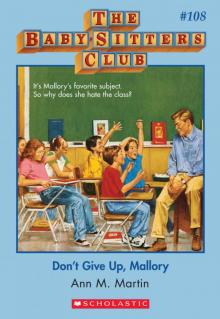 The Baby-Sitters Club #108: Don't Give Up, Mallory (Baby-Sitters Club, The)
The Baby-Sitters Club #108: Don't Give Up, Mallory (Baby-Sitters Club, The)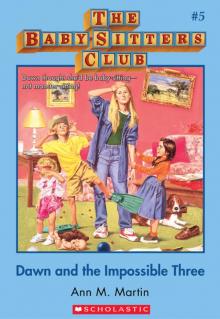 Dawn and the Impossible Three
Dawn and the Impossible Three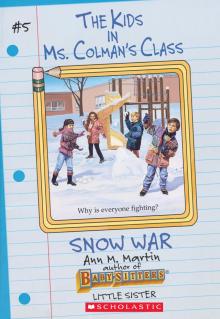 The Snow War
The Snow War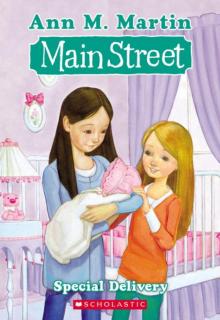 Special Delivery
Special Delivery Baby-Sitters Club 057
Baby-Sitters Club 057 Mary Anne And Too Many Babies
Mary Anne And Too Many Babies Baby-Sitters Club 030
Baby-Sitters Club 030